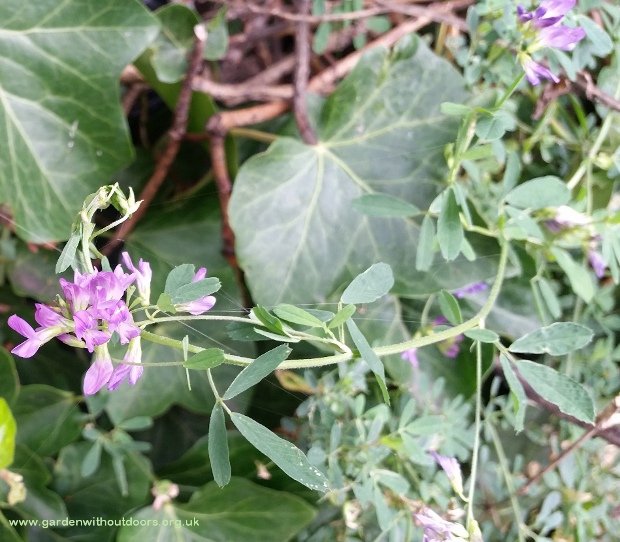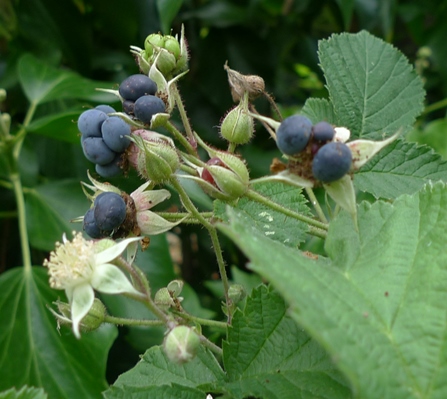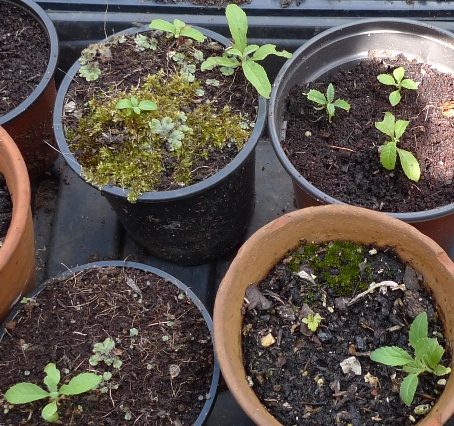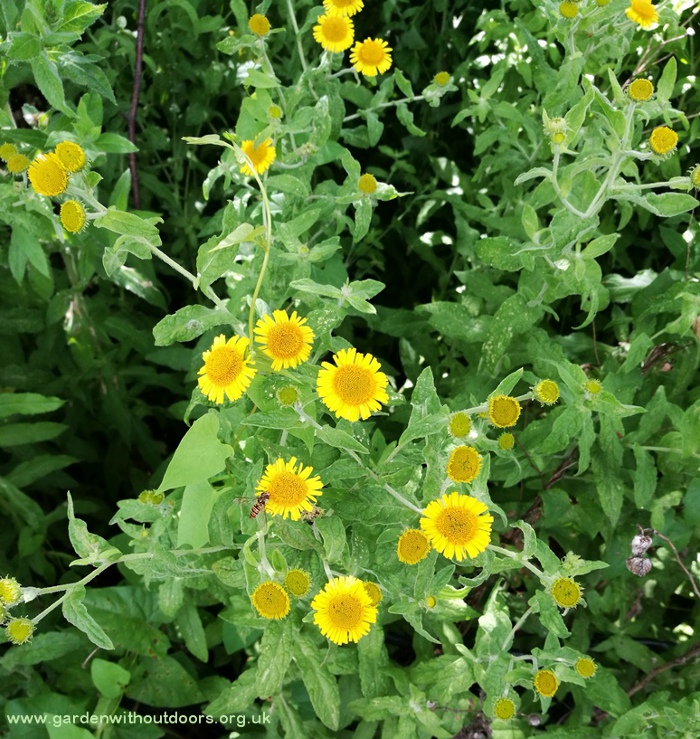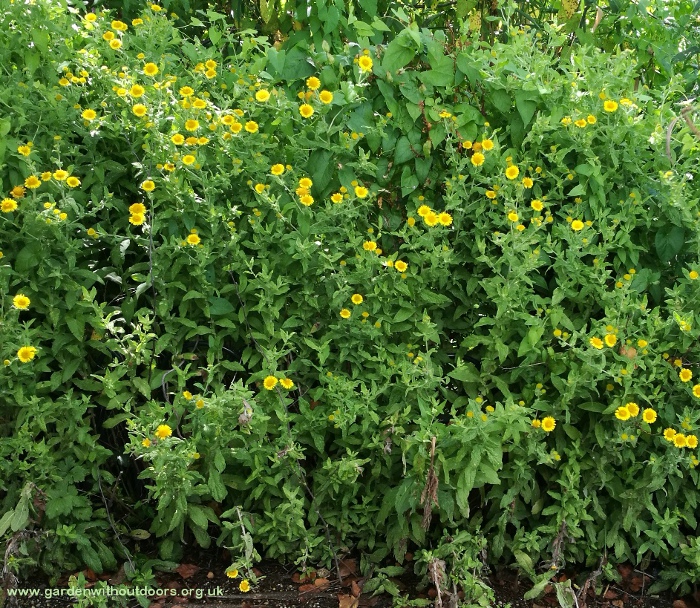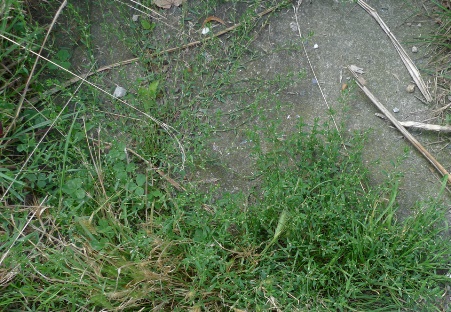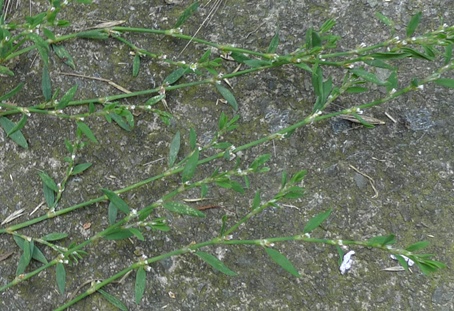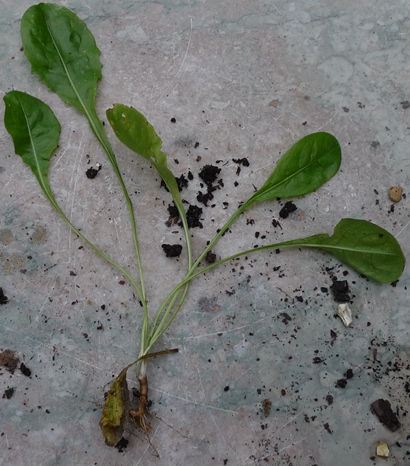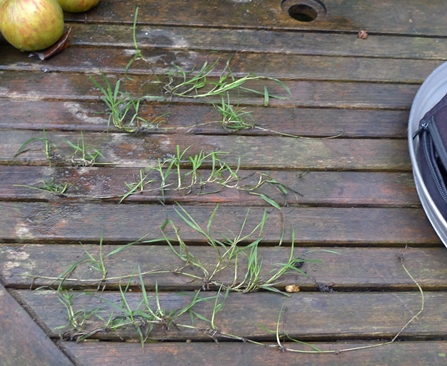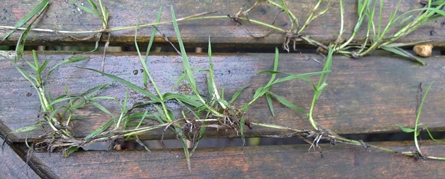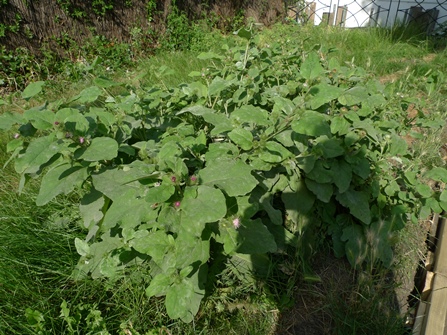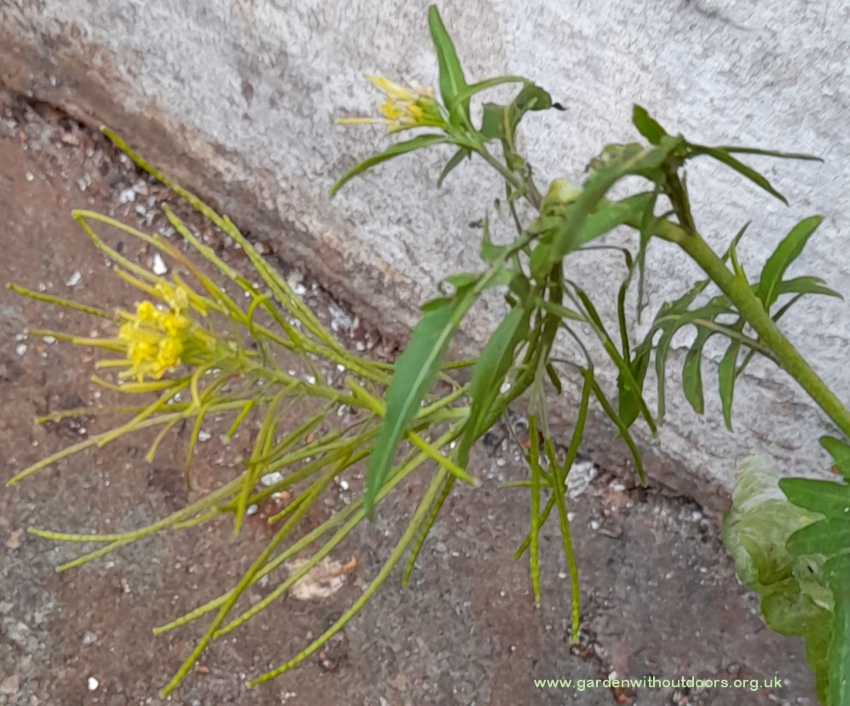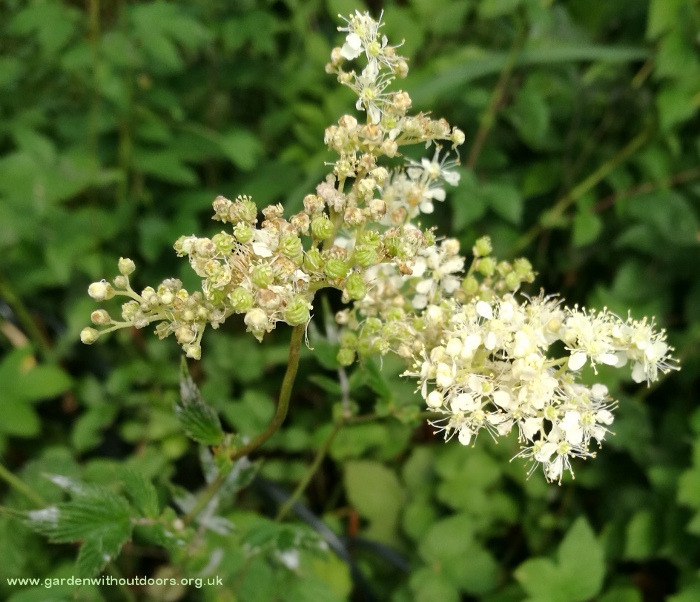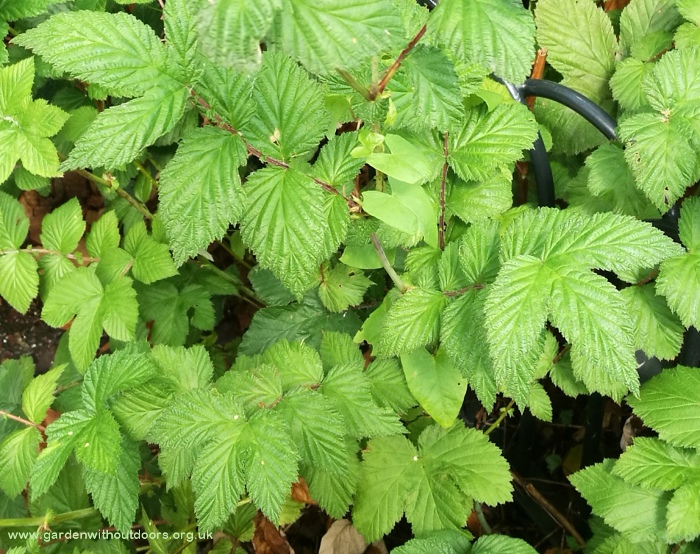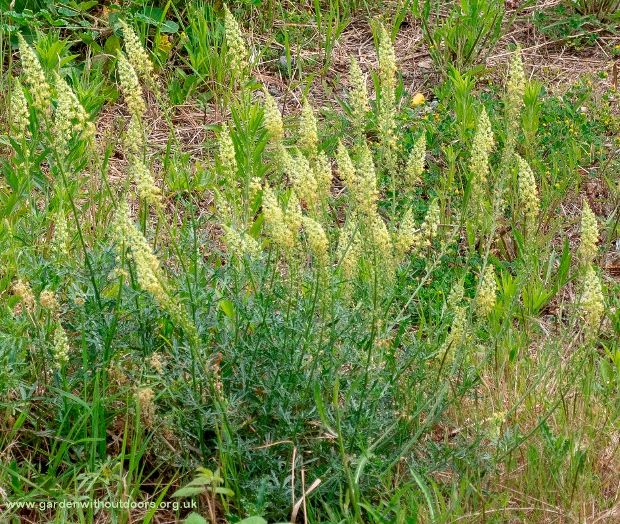Wildflower Identification Guide
This is a guide to some common wildflowers / "weeds" in the average north London garden. I took the first set of photos August 2010 and have been adding to them on and off ever since. All photos were taken myself unless otherwise noted.
I don't know exactly why I like knowing the names of the plants I find. It doesn't help control them but maybe it makes me feel more in control and looking at these plants has made me appreciate them as wildflowers. Please don't ever use pesticides. I never have and never will. Things I really don't want, such as dock, I dig up. But anything that is useful to bees, I think we have to try to live with.
The unknown plants are at the bottom of the page. I've moved the seaside plants to their own page and the saltmarsh plants are on their own page. I have also made a separate page with rosettes as so many plants start as a rosette. There are also pages about Japanese Knotweed, and Lamiaceae (mint, nepeta, deadnettle, etc) as I had so many similar flowers I wanted to compare.The following are in alphabetical order.
In order to make this information more accessible, I have listed the contents below and am working on adding clickable links to the specific plant. You can still just scroll through and look at the photos (beginning after the list) if you're not sure what you're looking for. (to be added: perennial sow thistle, sun spurge)
| Common Name | Latin Name |
| Agrimony | Agrimonia eupatoria |
| Alexanders | Smyrnium olusatrum |
| Alfalfa | Medicago sativa |
| Annual Mercury | Mercurialis annua |
| Granny's bonnet /Columbine | Aquilegia |
| Arum Lily/ lords-and-ladies | Arum maculatum |
| Autumn Hawkbit | Scorzoneroides autumnalis |
| Beaked Hawk's-Beard | Crepis vesicaria |
| Betony | Stachys officinalis |
| Morning Glory | Ipomoea |
| Bindweed | Calystegia sepium |
| Black Bryony/Black Bindweed | Dioscorea communis |
| Black Bindweed/Wild Buckwheat | Fallopia convolvulus |
| Black Horehound | Ballota nigra |
| Black Medick | Medicago lupulina |
| Bluebell | Hyacinthoides non-scripta |
| Bramble | Rubus |
| Bristly Ox-tongue | Helminthotheca echioides |
| Buck's-horn Plantain | Plantago coronopus |
| Buddleja | |
| Bugle | Ajuga reptans |
| Butterbur | Petasites |
| Creeping Bellflower | Campanula poscharskyana |
| Creeping Cinquefoil | Potentilla reptans |
| Caper Spurge | Euphorbia lathyris |
| Cat’s Ear | Hypochaeris radicata |
| Catnip | Nepeta cataria |
| Celandine, lesser and greater | Chelidonium majus, Ficaria verna |
| Celery-leaved Crowfoot | Ranunculus sceleratus |
| Cherry Laurel | Prunus laurocerasus |
| Chickweed | Stellaria media |
| Chinese Forget-me-not | Cynoglossum amabile |
| Mouse-ear Chickweed | Cerastium fontanum |
| Water Chickweed | Myosoton aquaticum |
| Chicory | Cichorium intybus |
| Yellow Suckling Clover/Lesser Trefoil/Lesser Hop Trefoil | Trifolium dubium |
| Cockspur / Barnyard Grass | Echinochloa crus-galli |
| Coltsfoot | Tussilago farfara |
| Comfrey | Symphytum officinale |
| Common Bird's-foot Trefoil | Lotus corniculatus |
| Common Daisy / Lawn Daisy | Bellis perennis |
| Common Field-Speedwell | Veronica persica |
| Common Fleabane | Pulicaria dysenterica |
| Common Knotgrass | Polygonum aviculare |
| Common Orache | Atriplex patula |
| Common Toadflax | Linaria vulgaris |
| Corn Chamomile | Anthemis arvensis |
| Corn Marigold | Glebionis segetum |
| Cornsalad | Valerianella locusta |
| Yellow Fumitory | Corydalis Lutea |
| Milkflower Cotoneaster | Cotoneaster Lacteus |
| Creeping Buttercup | Ranunculus repens |
| Creeping Oxalis, inc purple-leaved | Oxalis corniculata |
| Cut-leaved Geranium | Geranium dissectum |
| Dandelion | Taraxacum officinale |
| Danish Scurvygrass | Cochlearia danica |
| Dead-nettle | Lamium maculatum, Lamium purpureum |
| Broad-leaved Dock | Rumex obtusifolius |
| Enchanters Nightshade | Circaea lutetiana |
| Evening Primrose | Oenothera biennis |
| Fat hen | Chenopodium album |
| Feverfew | Tanacetum parthenium |
| Field Scabious | Knautia arvensis |
| Field Bindweed | Convolvulus arvensis |
| Flixweed | Descurainia sophia |
| Fool's Parsley | Aethusa cynapium |
| Forget-me-not | Myosotis |
| Fox-and-cubs | Pilosella aurantiaca |
| Foxglove | Digitalis |
| Fringecups | Tellima grandiflora |
| Gallant Soldier | Galinsoga parviflora Cav. |
| Garlic Mustard | Alliaria petiolata |
| Geranium | |
| Dove's-foot Crane's-bill/ Dovesfoot Geranium | Geranium Molle |
| Small-flowered Crane's-bill | Geranium pusillum |
| Geranium Rotundifolium | Geranium Rotundifolium |
| see also Herb Robert | |
| see also Cut-Leaved Geranium | |
| Gipsywort/Gypsywort | Lycopus europaeus |
| Goat's Rue | Galega officianlis |
| Buttercup | Ranunculus |
| Goosegrass / Cleavers | Galium aparine |
| Goosegrass / Indian Goosegrass / Wiregrass | Eleusine indica |
| Great Burnet | Sanguisorba officinalis |
| Great Water Dock | Rumex hydrolapathum |
| Greater Knapweed | Centaurea scabiosa |
| Green Alkanet | Pentaglottis sempervirens |
| Couch Grass | Elymus repens ??? |
| Ground Elder | Aegopodium podagraria |
| Groundsel | Senecio vulgaris |
| Hart's Tongue Fern | Asplenium scolopendrium |
| Hairy Bittercress | Cardamine hirsuta |
| Hawkweed | Hieracium |
| Hawkweed Oxtongue | Picris hieracioides |
| Hedge Bedstraw | Galium mollugo |
| Hedge Mustard | Sisymbrium officinale |
| Hedge Woundwort (also in South Coast) | Stachys sylvatica |
| Hemlock | Conium maculatum |
| Hemlock Water-dropwort | Oenanthe crocata |
| Hemp-agrimony | Eupatorium cannabinum |
| Herb Robert | Geranium robertianum |
| Himalayan Balsam | Impatiens glandulifera |
| Hoary Cress | Lepidium draba |
| Hoary Mustard | Hirschfeldia incana |
| Common Hogweed | Heracleum sphondylium |
| Honesty | Lunaria annua |
| Horsetail | Equisetum arvenses |
| Horseweed | Erigeron canadensis |
| Houndstongue | Cynoglossum officinale |
| Stinking Iris, Stinking Gladwin | Iris foetidissima |
| Ivy | Hedera |
| Ivy-Leaved Speedwell | Veronica hederifolia |
| Ivy-Leaved Toadflax | Cymbalaria muralis |
| Japanese Knotweed | Reynoutria japonica, synonyms Fallopia japonica |
| Joe Pye Weed | Eutrochium purpureum |
| Lamb's Ear | Stachys byzantina |
| Lemon Balm | Melissa officinalis |
| Lesser Burdock | Arctium minus |
| Lesser Knapweed | Centaurea nigra |
| London Bur-Marigold | Bidens Connata |
| London Rocket | Sisymbrium irio |
| Liverwort | Marchantiophyta |
| Maidenhair spleenwort | Asplenium trichomanes |
| Mallow | Malva sylvestris |
| Many-seeded Goosefoot | Lipandra polysperma |
| Sycamore Maple | Acer pseudoplatanus |
| Meadow Buttercup | Ranunculus acris |
| Meadowsweet | Filipendula ulmaria |
| Melilot | |
| Yellow Melilot | Melilotus officinalis |
| White Melilot | Melilotus albus |
| Milk Thistle see Plant Identification | Silybum marianum |
| Michaelmas Daisy | Aster Amellus |
| Mugwort | Artemisia vulgaris |
| Musk Mallow | Malva moschata |
| Black Nightshade | Solanum nigrum |
| Woody Nightshade/Bittersweet | Solanum dulcamara |
| Narrow-leaved Ragwort | Senecio inaequidens |
| Nipplewort | Lapsana communis |
| Old Man's Beard | Clematis vitalba |
| Oxalis | Oxalis latifolia |
| Pink Woodsorrel | Oxalis debilis |
| Iron Cross | Oxalis tetraphylla |
| Ox-eye Daisy | Leucanthemum vulgare |
| Oxford Ragwort | Senecio squalidus |
| Pale Smartweed/Pale Persicaria | Persicaria lapathifolia |
| Spotted Persicaria | Persicaria maculosa |
| Pellitory-of-the Wall | Parietaria judaica |
| Pendulous Sedge | Carex pendula |
| Perennial Sow Thistle | Sonchus arvensis |
| Petty Spurge | Euphorbia peplus |
| Phacelia tanacetifolia | Phacelia tanacetifolia |
| Pheasant Berry / Himalayan Honeysuckle | Leycesteria formosa |
| Pigweed | Amaranthus palmeri |
| Pineapple Weed | Matricaria discoidea |
| Pink-Sorrel | Oxalis articulata |
| Greater Plantain | Plantago major |
| Poppy, Atlas | Papaver atlanticum |
| Poppy, Field / Corn / Red | Papaver rhoeas |
| Poppy, Opium | Papaver somniferum |
| Prickly Lettuce | Lactuca serriola |
| Prickly Sow Thistle | Sonchus asper |
| Purple Loosestrife | Lythrum salicaria |
| Ragwort/Tansy Ragwort | Senecio Jacobaea |
| Red Campion | Silene dioica |
| Red Clover | Trifolium pratense |
| Red Valerian | Centranthus ruber |
| Ribwort Plantain | Plantago lanceolata |
| Rocket | Sisymbrium |
| Rush, Soft Rush | Juncus Effusus |
| Salad Burnet | Sanguisorba minor |
| Figwort ?? | Scrophularia grandiflora |
| Salsify | Tragopogon porrifolius |
| Stonecrop | Sedum Kamtschaticum |
| Sheep's Sorrel | Rumex acetosella |
| Shepherd's Purse | Capsella bursa-pastoris |
| Silver Birch | Betula pendula |
| Small-flowered Mallow | Malva parviflora |
| Small Nettle | Urtica arens |
| Smooth sow thistle | Sonchus oleraceus |
| Smooth Hawk's-Beard | Crepis capillaris |
| Soapwort | Saponaria officinalis |
| Spiderwort | tradescantia |
| Spotted Medick | Medicago arabica |
| Spotted Spurge | Euphorbia maculata |
| St John's Wort | Hypericum perforatum |
| Stinging Nettles | Urtica dioica |
| Storks-bill | Erodium cicutarium |
| Wild/Alpine/Woodland Strawberry | Fragaria vesca |
| Sun Spurge | Euphorbia helioscopia |
| Sweet Rocket | Hesperis matronalis |
| Swinecress, Lesser swinecress | Lepidium coronopus, Lepidium didymum |
| Tall Flatsedge | Cyperus eragrostis |
| Tansy | Tanacetum vulgare |
| Teasel | Dipsacus fullonum |
| Spear Thistle | Cirsium vulgare |
| Creeping Thistle | Cirsium arvense |
| Three-Cornered Leek | Allium triquetrum |
| Tree of Heaven | Ailanthus altissima |
| Tree Mallow | Malva arborea |
| Tree Spinach | Chenopodium giganteum |
| Tutsan | Hypericum androsaemum |
| Valerian | Valeriana officinalis |
| Great Mullein | Verbascum thapsus |
| Vetch | Vicia |
| Violet | Viola odorata |
| Viper's Bugloss | Echium vulgare |
| Wall Germander | Teucrium chamaedrys |
| Wall Lettuce | Lactuca muralis |
| Wall Speedwell | Veronica arvensis |
| Water Figwort | Scrophularia umbrosa |
| Water Mint | Mentha aquatica |
| White Campion | Silene latifolia |
| White Clover | Trifolium repens |
| White Deadnettle | Lamium album |
| White Stonecrop | Sedum album |
| Wild Angelica | Angelica sylvestris |
| Wild Buckwheat | Fallopia convolvulus |
| Wild Cabbage | Brassica oleracea |
| Wild Garlic / Ramsons | Allium ursinum |
| Wild lettuce | Lactuca virosa |
| Wild Mignonette | Reseda lutea |
| Willow | Salix |
| Willowherbs: | |
| Broad-leaved Willowherb | Epilobium montanum |
| Short fruited Willowherb | Epilobium obscurum |
| Great Hairy Willowherb | Epilobium hirsutum |
| Rosebay Willowherb | Chamaenerion angustifolium |
| Wood Avens | Geum urbanum |
| Yarrow | Achillea millefolium |
| Yellow chamomile | Cota tinctoria |
| Unknowns |
I saw this in a local park end of July 2021
new growth of leaves in December 2020
Alexanders (Smyrnium olusatrum)
I mistakenly had this as wild parsnip but a friend advised it was Alexanders, unlike many of the umbellifers this has yellow flowers, I saw this along Regents Canal, April 2017. (black horehound on the left)
February 2019 some Alexanders along the canal in the same place, just starting, no tall stems emerging yet (aucuba behind)
close-up of the Alexanders leaves
Thanks to Michael for identifying this (via FB). I saw this along the Regent's Canal near King's Cross.
close-up of the flowers
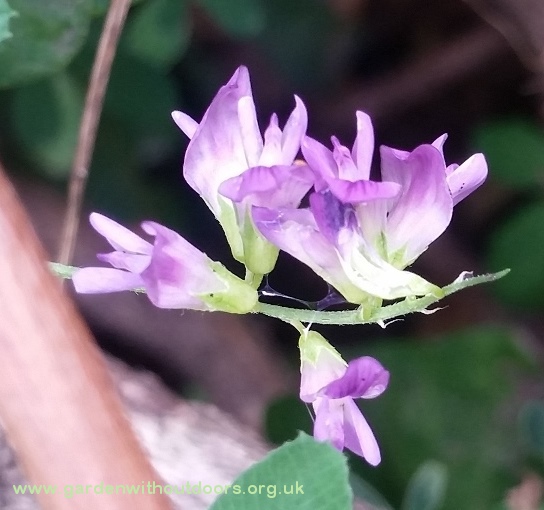
The following 3 images are all Annual Mercury. Last year I had it all over my front garden, as did my neighbour but after I weeded my garden and her garden well it didn't bloom and set seed so have much less this summer. Annual, easy to pull out.
I include it to help those that may find it growing from self-seeding. Sometimes they get invasive and are pulled up as weeds. I like them because they bloom early before other plants have started. Annual, can be difficult to pull out - quite strong roots. Various coloured flowers.
Here are some aquilegia in bloom.
To the right of the aquilegia is a stachys byzantina, or lambs ear which self-seeds like mad so you may find it springing up like a weed in your garden.
aquilegia seedling, they have these rosettes of leaves which unfurl as they grow - very attractive
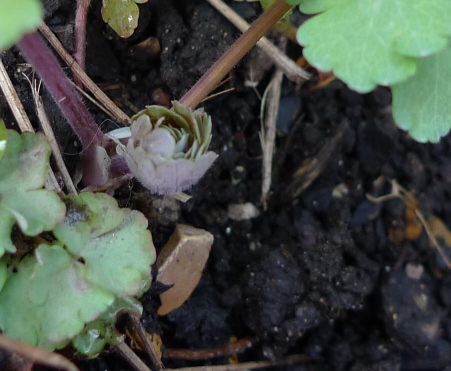

aquilegia with powdery mildew which they seem prone to
Arum lily / lords-and-ladies / cuckoo-pint (Arum maculatum)
I saw these in the walled car park round the corner from me on 2-9-2017 so everything is gone but the berries and a couple of lone leaves. I see lots of petty spurge amongst them and corydalis lutea to the left. I'll have to go back in the spring and take more pics.
Autumn Hawkbit (Scorzoneroides autumnalis)
this example is much smaller than some of the yellow composites, these were only about 12 cm tall, seen August 19th southeast London
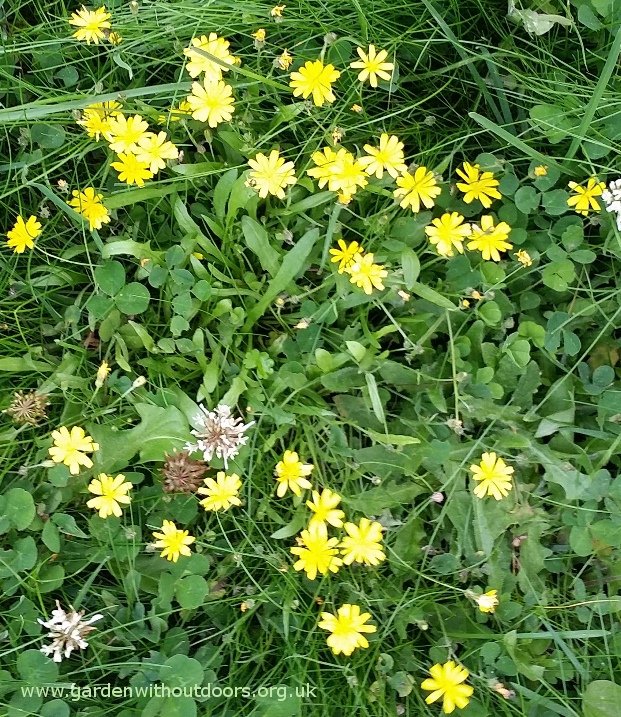
I saw this Sept 12th in the "wild garden" at Ham House, Surrey.
This is Morning Glory. I include it to distinguish it from bindweed which follows. They are very similar. (to the right are the Honesty seed pods)
Bindweed (see also field bindweed), white flowers similar to morning glory. Easy to pull out at ground level but must be untangled from the plant(s) it has twisted around.
It can be quite long as it tangles around something, even itself. The flowers were 5.5 to 6 cm long on this one.
closer view of the leaves
early shoots of bindweed
"Black Bindweed" can refer to tuberous Black Bryony or the annual Wild Buckwheat, each listed below. (thanks to Jacqui who explained they were 2 different plants)
Black Bryony/Black Bindweed (Dioscorea communis)
Thank you to Freda and Les who alerted me to this and provided the photos. They have read that the berries and tubers are both poisonous so beware.
a close-up of the heart-shaped leaf
a close-up of the flowers
Sept 2018, I have finally seen black bryony myself, at RSPB Fowlmere in Cambridgeshire. It was after flowering when it had red berries.
Black Bindweed/Wild Buckwheat (Fallopia convolvulus)
I am sure that this came from bird seed (see above Bird Seed Weeds).
Nov 2015 I had a few self-seeding, as of April 2016 these appear to have died over winter but I will keep and eye on those pots and see if they return and hope to see flowers if they do.

May 2016 and the wild buckwheat is back.

I potted it up and it's already produced some buds a few weeks later.
a close-up of the buds a few days later
a couple days later and the flowers are in bloom
Going back to last year (10-2015), I now know that these seedlings were wild buckwheat.
I pulled up one (slightly larger about 10 cm tall) from this area recently (7-2016).
August 2018 I saw this along the Regent's Canal near me and wondering if it's black bindweed / wild buckwheat.
Black Horehound (Ballota nigra)
I saw this along the canal 17-6-2018, much larger and more flowers than the previous one below.
I wanted to clearly show the stem with the whorls.
I saw this along the Regents Canal May 2017. It does look similar to deadnettle which I have loads of in my garden but haven't had this.
I wasn't sure what it was but the pink flowers, on some plants further along the canal, made it identifiable.
Black Medick (Medicago lupulina)
This (I think) was in a mix of seeds of Wildflowers of Ireland my neighbour brought back from a trip there a few years ago. I planted the seeds in pots which have been back and forth between our patios and didn't really keep track. This self-seeded between the paving stones on her patio recently but I'm not really sure when they started. It's only in hindsight I realise where they came from. This is actually quite small, I found it difficult to take photos in focus, this one shows at least the bit at the end of the leaf that sticks out, will try again to take some more photos.
black medick is actually very small, here it is in situ
These may be nice in a wood but in my garden they are very annoying. They form large clumps that prevent other plants from growing. They are perennials that grow from bulbs and must be dug out. I try to do that whenever I find them. This photo was taken after this bluebell finished blooming. The stem of spent flowers is on the left.
bluebell flowers end of March (following 2 photos)

when you have flowers the bluebells are easy to identify but if they haven't bloomed yet, as those below, the leaves have a ridge down the back unlike hyacinth leaves which are smooth making them easy to identify (thank you to Barbara for this info - some of us really don't want bluebells in the garden)
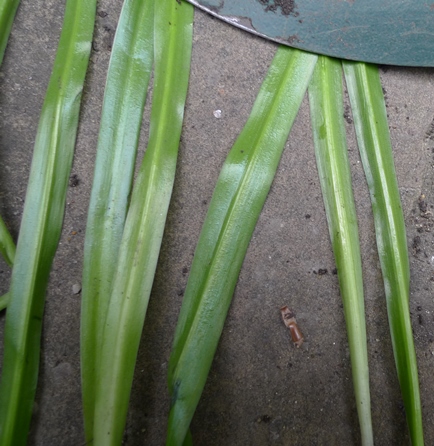
I wasn't sure if these were bluebells or pendulous sedge, or indeed something else. So I thought I would dig them up to be sure.
They are bluebells! with those white bulbs underground.
Then I had a horrific thought. What if all these are bluebells as well. I sort've thought they might be hyacinths - but the hyacinths are already in bloom whereas these are all leaves. I decided to "go for it" and dig them up as well (this is my main flower bed in the sun, above is a shady less important part of the garden).
They are also bluebells, with the white bulbous roots.
Here's a bluebell with a flower coming into bloom
This is one that got away! I've been weeding them out like mad but missed this one which has gotten to be 46 cm high.
At the bottom of the stem is a new flower emerging.
Bluebells do come in different colours, white on the far left, then pink, then shades of purple and blue.
also see bluebells: native or foreign invaders?
Perennial with tough spreading roots which must be dug out and even then difficult to get all of it as it spreads so far. There are over 400 types of bramble in the UK (according to one of my wildflower books) so it makes sense I have a couple of types. The second one has finally bloomed and produced berries (it can be so difficult to ignore weeds waiting for them to flower, I've been itching to take the secateurs to them).
this is one type, in my front garden, which I think of as the usual wide-spread type of bramble, blackberry-type berries
here's the flower of the 2nd type in my back garden, leaves on the left in the pic below
here are the berries that go with the flower above
the two types of bramble leaves I've noticed
What I think of as the "usual" bramble has lots of fierce thorns (top stem), the other variety is tame in comparison with quite mild thorns which I can touch quite easily
Bristly Oxtongue (Helminthotheca echioides)
I previously only had this on my Identification - South Coast page but I saw it in southeast London yesterday (19-8-2017). Those bracts below the flowers are a distinctive feature as are the blisters on the leaves. One of the plants had very purple-red stems.





those bumps or blisters on the leaves are a distinctive characteristic of bristly oxtongue
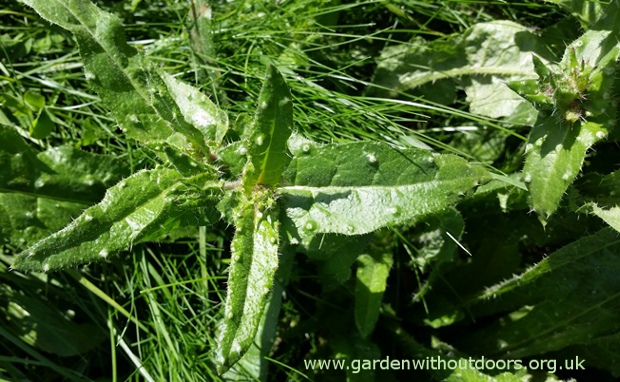
flowers visible on a few of the spikes
flower close-ups
the stamens can be quite long
Buddleja. It may appear as a weed as it can self-seed and sprout up anywhere. Often seen on buildings, roofs, etc. and can cause damage, eg growing through a brick wall. Must be dug out or just cut above ground level if the roots have spread.
I'm adding another photo of a buddleja I noticed growing in the wall of a house around the corner from me. I guess the seed blew into one of the damp course holes in this wall (I assume that's what they are). This example shows how these buddleja take root anywhere.
This buddleja suddenly appeared in the pot below..
Buddleja flowers
buddleja seedling
This was taken at the beginning of March. I didn't know what it was at that time. By now (end of May) it's looking very buddleja-like (next pic).
I think these are even smaller buddleja seedlings but I will be able to confirm in a few weeks.
yes those above are buddleja
as soon as those curved middle leaves appear, you can confirm its buddleja

flower close-up
at a park nearby
butterbur flowers
before the flowers appear, it's difficult to tell what the plant is, the round leaves are similar to wild garlic
This campanula (creeping bellflower) has attractive blue flowers but I guess it might get invasive and be considered a weed. I just pulled a clump out that was smothering my lily of the valley. Here's a clump that's taken hold on my path.
campanula flower
Caper Spurge (a type of Euphorbia)
I hadn't seen a caper spurge in my garden for so long at first I didn't realise what it was. I used some home-made compost recently and I suddenly have one appearing. It's younger and fresher than the one above (which was in my first set of weed pics), it got bent so difficult to take a pic in situ so pulled it up.
about 15 cm
propped it up to see it from above
I don't usually see the seedheads as I pull out any caper spurge I find before it gets to that point but I saw this locally the other day, growing in a newly planted bed so it grew very well, very quickly.
This white-flowered plant is the herb, grown from seed. I have never seen a Nepeta cataria plant for sale. The related purple-flowered plant, garden catmint (Nepeta faassenii) is widely available from garden centres. I have never seen Nepeta faassenii seed for sale. Cats like both.
The plant in this pot is from seed sown in previous years. The one above I grew from seed this year.
nepeta and dead-nettle can look similar, comparison below, see Lamiaceae page for more comparison among related plants
Cat's Ear (Hypochaeris radicata)
I saw this recently (30-7-2017) in my sister-in-law's garden in northwest London.
May 2019, much nicer examples
This was my original cat's ear pic from 2011 and I'll be honest, I'm not sure if it's cat's ear. At the time I didn't know as much about weeds and wildflowers, especially all these yellow-flowered ones. Looking at it now, I see branched flower stems which cat's ear doesn't have. It's quite mangled so difficult to say but I think it's nipplewort.
greater celandine
saw this in east London
more of those very distinctive leaves
Lesser Celandine
I've been looking at weeds for some years (at least since 2010) and have only just seen lesser celandine locally (February 2018) in a park across the road. (common field speedwell leaves top right)
whole lesser celandine plant with flower buds just opening
and suddenly this year (2018), I'm seeing more lesser celandine
I saw this lesser celandine with bronze leaves in new planting at Kings Cross so it's a garden plant, not just a weed. It does have very early flowers.
Celery-leaved Crowfoot / Buttercup (Ranunculus sceleratus)
This was briefly in my Unknowns but thanks again to my Illustrated Book of Wildflowers (yes, a book, still a great resource) I was able to identify this. It really confused me that the leaves top and bottom were different shapes but the book confirmed that. I saw this along Regents Canal initially 30-4-2017 but just had to go back 2-5-2017 to get better pics.
the upper leaves are clearer in this pic (excuse my feet at the bottom)
the lower leaves are clearer in this pic
Cherry Laurel (Prunus laurocerasus)
This acts very much like a weed - it self-seeds and grows too large. This self-seeded in a pot this summer. Finally realised what it was.
close-up of the top leaves
This is in my garden, was here when I moved in, think it self-seeded at some time in the past. It's only advantage is it copes with the shade. Decided to remove it recently before it gets to tree-like proportions. There was a huge tree next door which had to be cut down as it was growing in a flowerbed (will find photo).
close-up of the bark
After I cut this down, I have it reshooting, the shoots look a bit different from any of the above examples. This is a very persistent tree.
Chickweed seedlings
I got a few pots from freecycle and wanted to see what would grow, in this case chickweed!
I let it grow and flower so I could take some clear pics

close-up of those flowers

those examples of chickweed above look very lush and green but I saw some on the pavement down the road that were much more sparse, they adapted to their harsher conditions
in the front with buds at the top (flowering rosemary in the background)

I finally decided I had to pull it out even though the flowers hadn't opened as I really want that rosemary to thrive and not make it compete with a weed. I'm happy with the ID of mouse-ear chickweed for this.


Water Chickweed (Myosoton aquaticum)
I saw this at a nearby park June 2019. I was intrigued as the flowers do look like chickweed but the entire plant is a larger scale and the leaves quite different. Growing quite happily in a dry environment even though it's "water" chickweed.
close-up of the flowers
Chicory is a flower I love and I have it in my garden, grown from seed but while out walking through the "wild" area of Allen Gardens in Spitalfields (East London) the other day I saw some great examples and realised it's a weed in some circles, definitely a wildflower, so should include it here to help with identification.
close-ups of the flower
this shows the arrangement of the buds along the stem
I wanted to show a close-up of the lower leaves
the upper leaves are quite small in comparison
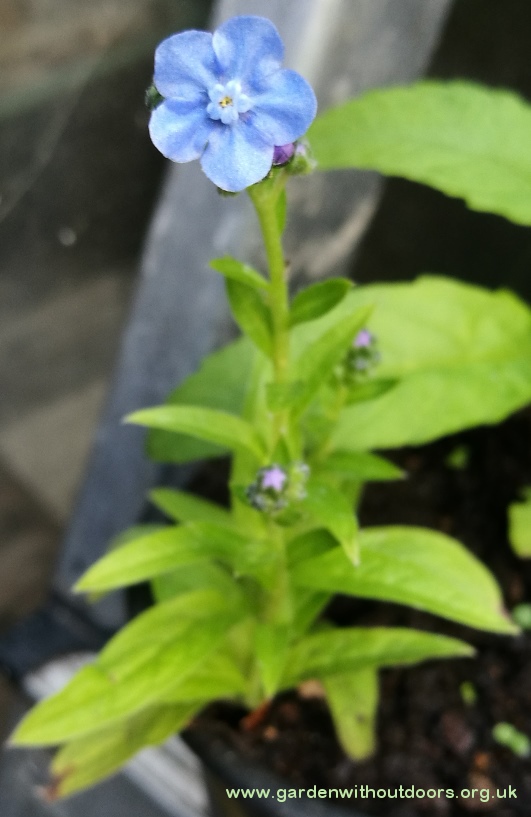
this was the Chinese forget-me-not seedling a few weeks earlier, the first time I noticed it self-seeded in a pot, I didn't know what it was but left it to see what it turned into
a couple weeks later it has buds
By that I mean Yellow Suckling Clover/Lesser Trefoil/Lesser Hop Trefoil (Trifolium dubium), or so I've just discovered by googling. I thought it was just Clover! It is all over most of the garden next door which I look after. I never noticed it specifically. I mean I knew there was some clover over there but not this much.
Yellow flowers seem to have taken over the garden next door. I have a lot of creeping buttercup (left, below) at the moment and wanted to compare the flower to that of the clover (right, below) although it's not the clearest pic of the clover. I'll take another but wanted to show what I have in the meantime. I've also dicovered Wall Lettuce and Hedge Mustard recently and of course, there's still the odd smooth sow thistle, nipplewort and coltsfoot, all with yellow flowers.
Cockspur / Barnyard Grass (Echinochloa crus-galli)
I saw this on the pavement down the road from me by the Sainsbury's on Camden Road.
close-up of that plume at the top
I've been told this is Coltsfoot and possibly invasive. I've not seen it before. It suddenly appeared in the garden next door. On the left is the coltsfoot, on the right a hollyhock and on the left and spreading through underneath is pellitory of the wall.
a couple weeks later, the strikingly coloured stems are more pronounced
It's quite similar to hollyhock, as noted above but worth showing ano photo (below, taken June 2014). Coltsfoot leaf is smooth and shiny, hollyhock is quite textured.
The Coltsfoot is in bloom (March 2014).
The next day the flowers are fully open.
Suddenly the coltsfoot has gone mad - numerous stems and flowers, including dandelion-like ones ready to blow seeds everywhere so I've put it straight into the garden waste bag, not even taking time for a pic before I did it in case any of those seeds got away.- update - of course now I regret being so agressive in its removal - I listened to the negative voice when I should have had more confidence - now I do and I will keep any "weeds" (even thistles) if I want
Comfrey (Symphytum officinale)
a purple wildflower I grew from seed
I saw this one with white flowers in Allen Gardens, Spitalfields (East London) the other day.
Common Bird's-foot Trefoil (Lotus corniculatus)
I guess I've seen this before but it was only yesterday I saw a really nice flower and got some decent photos (outside Pets at Home - a good place for wildflower weeds sometimes).
close-up of the leaves
patches of common bird's-foot trefoil
Common Daisy / Lawn Daisy (Bellis perennis)
low rosette with buds
Common Field-Speedwell (Veronica persica)
Apologies fellow gardeners, I had this listed as ground-ivy, a recent addition here, but those buds opened today (11-3-2017) and I was able to take a photo and it's definitely not ground-ivy but common field-speedwell, a wildflower I had not encountered before (first noticed it Feb 2017). It's similar to deadnettle so maybe I just didn't take note before. BTW I love those purple flowers and will not be removing it.
close-up of the flower
bare lengths of stems between groups of leaves
It happens to be growing in the same pot as some deadnettle (on the right) which I originally mistook it for as I have lots of deadnettle everywhere now (I like the small flowers, esp as the bees love them) but here it's easy to see the deadnettle has differently textured leaves which have rounded lobes. The field-speedwell leaves are smooth and toothed. (in the middle is forget-me-not and larger leaves at the top, green alkanet)
Common Fleabane (Pulicaria dysenterica)
close-up of the flowers with a hoverfly
entire plant
a bank of common fleabane plants, about 1 to 1.5 m tall
The specimen above looks so small unlike the large clump I noticed the other day.
here is a close-up of that
One of the freecycle pots had common knotgrass which I allowed to grow to see the flowers produced. I didn't realize the "knots" above had the little white flowers but I hadn't taken close-up enough photos. Here are a few I took today:
a wider view of that common knotgrass
Common Orache (atriplex patula)
I saw this growing on the pavement outside my house. I won't pull it out until it flowers.
I saw this common orache along the canal (middle of May 2017). I didn't recognise it at first as I've only previously seen this weed the one time above.
2 weeks later it started to bloom
another clump, in a sunnier position further along the canal, had more flowers
Common Toadflax (Linaria vulgaris)
I think this is usually upright but the plants I saw today (July 2019) were leaning over.
Corn Chamomile (Anthemis arvensis)
definitely a wildflower, not sure how much it's considered a weed, I have it from sowing some wildflower seeds from Ireland a friend gave me
lots of wildflowers have daisy-like flowers - can be confusing, I have ox-eye daisy but I know there are others
Corn Marigold (Glebionis segetum)
Cornsalad (Valerianella locusta)

Corydalis Lutea (yellow fumitory), grown as a garden plant but I pull it up as a weed as it self-seeds around my garden, including on walls, and I don't really like it. Easy to pull out.
Milkflower Cotoneaster (Cotoneaster lacteus)
This is also on my Plant Identification page but it also behaves very weed-like, eg self-seeding and being a thug and difficult to remove.
I have never seen a flower, or any distinguishing feature, on this shrub in the garden next door but recently I noticed there's one that blooms and produces seeds nearby so that could be where this came from and the seedling in that pot below.
If left, creeping buttercup soon spreads and gets more and more difficult to pull out. The first one below I tried to pull out with the roots but it just broke off. It was developed enough to have bloomed.
As below you can see these creeping buttercup have multiple stems and they make a very difficult plant to pull out but it's worth trying to get the whole clump.
February 2018, I noticed a small creeping buttercup seedling in a pot and tried to pull it out. Very difficult! seeing how long the roots are I can see why. A very tough weed to dig out from the the garden
Creeping Cinquefoil (Potentilla reptans)
March 2019
May 2019 it's in bloom
Creeping Oxalis (Oxalis corniculata)
Spreads so can be difficult to get all the parts but if traced can be easily pulled out.
There is a purple-leaved variety of creeping oxalis. I saw this in the road around the corner, end of May 2018.
This Oxalis (below) which I pulled up the other day (Sept 2014) shows 1. how long the roots are which did made it difficult to pull up 2. how runners extend the plant 3. a tiny bud in the middle at the top.

this shows how oxalis puts out runners which helps it spread so much, it loves the cultivated soil in my pots but that also makes it easy to pull out
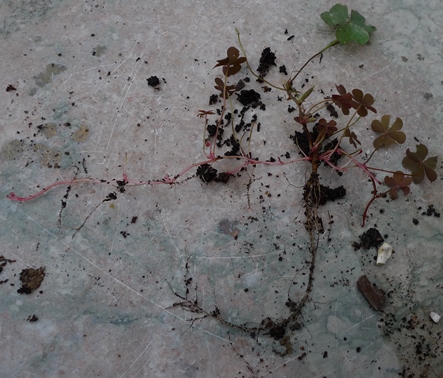
Cut-leaved Geranium (Geranium dissectum)
Dandelion tough roots that must be dug out - if you really really don't want them but it is useful for bees, especially early when other flowers are not in bloom. I try to leave any in my garden or pots now.
dandelions usually have toothed leaves but some don't (there are loads of different ones of which I'm just learning)
Danish Scurvygrass (Cochlearia danica)
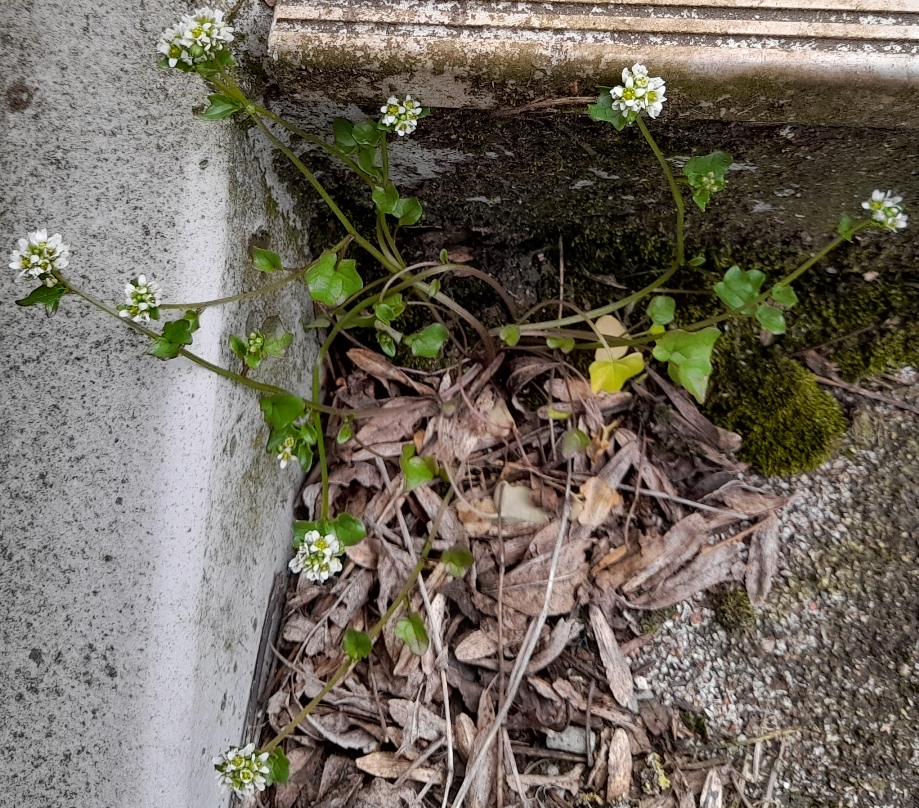
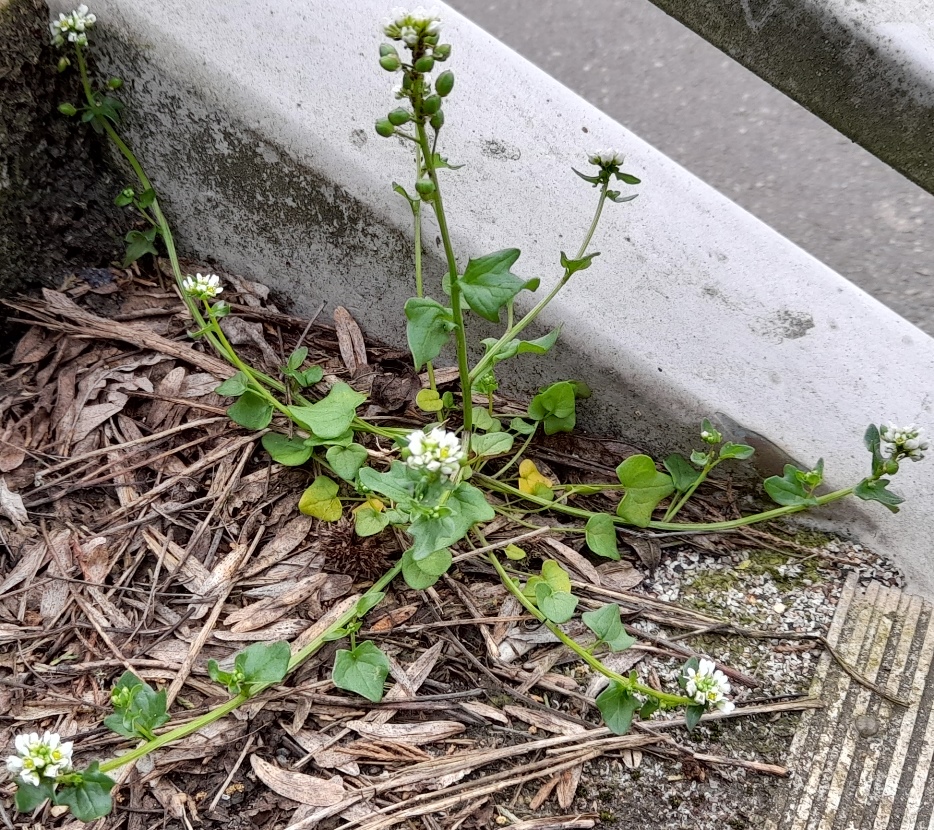
I'm seeing a few different dead-nettles.
Spotted Dead-nettle (Lamium maculatum)
I think this is spotted dead-nettle
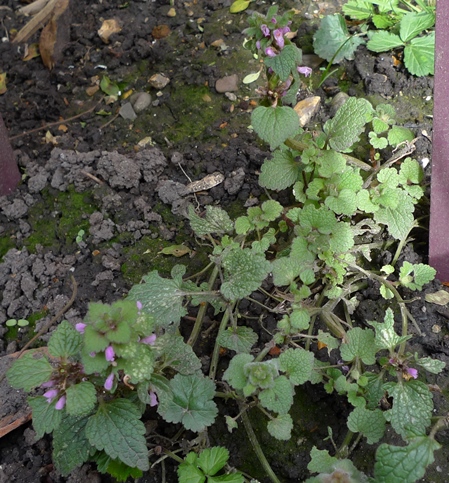
I think this is another spotted dead-nettle. Unfortunately I didn't see any flowers on it and it's disappeared from my garden.
Red / Purple Dead-nettle (Lamium purpureum)
this is in a small park across the road, one of the first weeds/wildflowers in bloom, March 2018
comparison of spotted (?) on the left and red on the right, luckily I happened to see them near each other at a local park, clearly different types
Broad-leaved Dock (Rumex obtusifolius)
This is one of the first weed photos I took, before I realised, the photos are much better before the plant is pulled up
This second pic shows a much smaller plant (2 large leaves at the front) and interestingly some other weeds, back, right creeping buttercup, centre right stinging nettle and couch grass at the front and in the middle.
This third image of dockweed (from another neighbour's garden) is of a plant between the other two in size. The tall plant to the right is a teasel. - correction - reviewing this pic and knowing that later there was lesser budock there, I think that's burdock and not dock at all.
This fourth pic of dockweed shows a close-up of the flowers and how differently shaped are the upper leaves on the plant in contrast with the large lower leaves.
small dock plant/seedling, these leaves (below) are between 3 and 6.5 cm, not very recognisable as a dockweed yet
another type of dock? (I think), still researching what kind
this is in the garden next door but I also just saw it on the pavement a few houses down the road
close-up of the flower on the above plant
Enchanters Nightshade (Circaea lutetiana)
Perennial, easy to pull out, see below how all the roots have come out when it's pulled up but if you miss one little bit it can grow a new weed.
If you have to have a weed it's great to have one like this where the entire root comes out.
Here are the earliest seedlings of Enchanter's Nightshade.
1.
2.
3.
Evening Primrose (Oenothera biennis)
I saw this in the protected environment of the walled carpark round the corner from me 2-9-2017
a plant still in bud
an even earlier plant which I noticed first, then the more developed buds above, then the flowers above that so I realized this is evening primrose, in isolation not sure I would have, well maybe now after I've seen these examples
I found this first one today (8-9-2013) and I don't think I've ever seen a specimen of fat hen with so many flowers and so tall. I didn't measure it but it must be close to 20 cm tall.
yesterday (25-9-2014) I did find an even larger fat hen
August 2017 and I have a new tallest fat hen. I saw this in Allen Gardens, Spitalfields (East London)
close-up of the flowers
fat hen seedlings
earliest seedlings, first week
fat hen after a few weeks
and even later
I had so many of these seedlings in a seed tray I thought they were maybe something I'd planted but as they grew they became recognisable.
June 2021 I haven't seen much fat hen in my garden for a few years but I saw these around the corner, self-seeded in the cracks.
Feverfew (Tanacetum parthenium)
I saw this feverfew locally, 8-2019
I have it in my garden and it self-seeds. I've heard it's repellent to bees so I started to pull it out but it keeps coming back and I don't know about its affect on bees for sure.
Feverfew flower
Field Bindweed (Convolvulus arvensis)
I did just have this on my South Coast and Downs page but I saw it near to me in London so I'm adding today's (13-6-2018) photo here. I suspect this is from a mix of wildflower seeds.
Field Scabious (Knautia arvensis)
I hope this photograph shows it clearly enough for identification, the leaves at the bottom are amongst a teasel. I planted wildflower seeds for this so not sure how wide-spread in London.
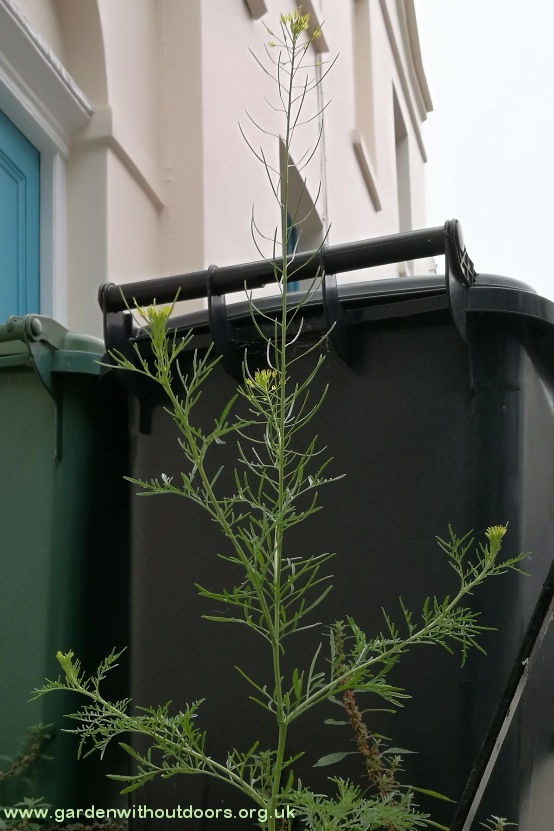
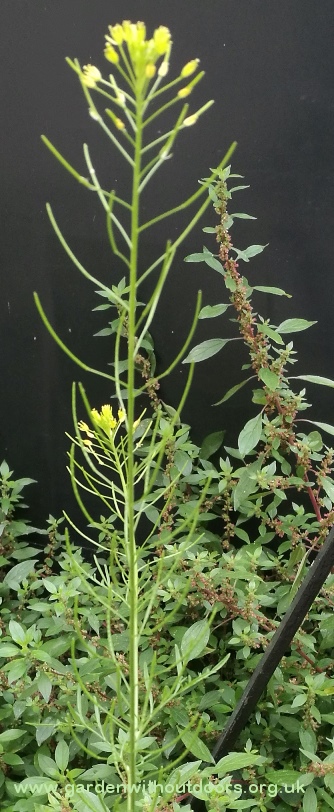
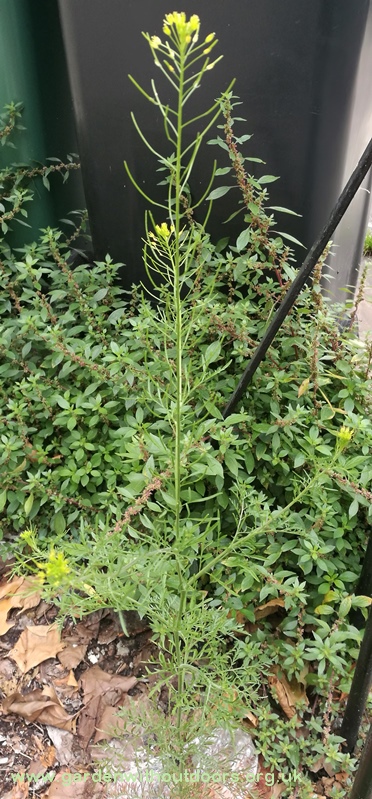
Fool's Parsley (Aethusa cynapium)
I saw this at the community garden on Hampstead Rd at the HS2 works January 2019.
Forget-Me-Not, blooms very early in the spring, I guess this is next year's crop. I let them grow until they get invasive and compete with other plants then I pull them out. Easy to pull out.
Here are some forget-me-nots later in the season after they have bloomed. A weed or welcome flower, your choice.
Fox-and-Cubs (Pilosella aurantiaca)
I bought this at the garden centre as a wildflower but some may find it invasive in their garden.
these are new plants the next year that self-seeded from my originals
I grow these from seed but there are always some that sprout up unexpectedly from self-seeding as this one did. They are a wonderful flower but not if they sprout up in the wrong place.
foxglove flower
This foxglove self-seeded in my neighbours' brick wall. I love foxgloves but this one is in the wrong, potentially damaging, position.
Fringecups (Tellima grandiflora)
I saw this in a restricted access area near the Regent's Canal so although they aren't in focus I couldn't easily go back and re-take them. I do hope to get back there one day.
Gallant Soldier (Galinsoga parviflora Cav.)
Saw this on the pavement nearby.
a close-up of the above plant
Garlic Mustard (Alliaria petiolata)
A reader asked me about this and suddenly I saw a lot of plants locally (end of April 2017), especially along the Regent's Canal. I've never seen it in my garden.
close-up of the flower
the spiky bits are the seed capsules left after the flowers are finished
Reading about it, the first year the garlic mustard starts as a rosette of leaves and then grows taller and blooms in the second year. I went back to the canal and noticed a number of these small plants nearby, not that rosette-like but I still think these are the new first year garlic mustard plants.
I saw this off Hampstead Rd, near the railway lines out of Euston. It's in flower so quite identifiable unlike the one below which I saw in the garden next door
I gave up waiting for this to flower, I don't know why, the one I found above is quite pleasant, but I think this is also geranium molle.
that plant a month later
I think this is geranium rotundifolium but I only saw it yesterday (14-10-2017) for the first time and I never heard of it before but the flowers do not match the other geranium wildflowers I know. It's also in bloom in October when some resources suggest an earlier finish to flowering but it seems with global warming the usual "rules" are out the window.
Small-flowered Geranium (Geranium pusillum)
I was looking at a weed on the other side of this lamp post when I noticed the small purple flowers on a geranium on the other side - unmistakeable as a geranium with those distinctive leaves. I took photos, of course, and when I researched it, realised it was a different geranium from others I've seen. The flowers were so small I had to get right down to take close-up photos, none of which are that great so will go back and try again but in the meantime I've added the photos I have.
Gipsywort/Gypsywort (Lycopus europaeus)
July 2017 It has been so hot and dry and the canal quite barren. It's finally rained and this gipsywort has sprung up and bloomed.
this was along the canal a few months before, in April, I was hoping to see if it had flowered but it was long gone after the weeks of drought, it wasn't right by the water like the one above, I presume it is gipsywort although it's so different from the fresh bright green example above
Goat's Rue (Galega officianalis)
I saw this along Regent's Canal August 2018. I went back a week later to examine it further but it had been mown, sadly. Just going by these photos I think it is goat's rue although it does look similar to vetch.
January 2019
straight narrow leaves aside from a few at the base of the usual buttercup shape
Goosegrass/ Cleavers (Galium aparine)
very early goosegrass seedling
at first I didn't recognise it but as it grew and I touched it and found that dry stickiness, it became clear it's goosegrass
early pic of goosegrass (taken before I realised not to pull the weeds up before I take a pic)
tiny white flowers of the goosegrass, below, buds just visible in the pic above
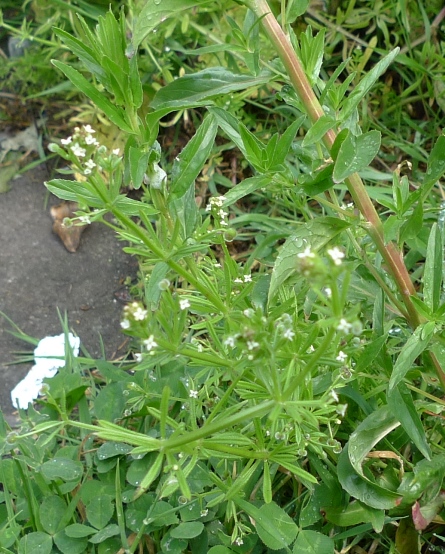
goosegrass/cleavers seedling
Goosegrass / Indian Goosegrass / Wiregrass (Eleusine indica)
Great Burnet (Sanguisorba officinalis)
close-up of the flowers
I don't know if that bee was on the great burnet - I didn't even realize a bee was in the photo until I was at my pc.
close-up of the great burnet leaves
Great Water Dock (Rumex hydrolapathum)
I think this must be great water dock, seen August 2018 along Regent's Canal.
Identifying the example above, it has made me review this dock which I had previously identified as sharp dock but I think it must be great water dock as well.
This is along the Regent's Canal, London NW1, August 2017.
close-up of the flowers
Greater Knapweed (Centaurea scabiosa)
I love greater knapweed and bought wildflower seeds to grow it in my garden. I did see it on the South Downs once (see Identification - South Coast).
This is a small greater knapweed plant in March.
Green Alkanet (Pentaglottis sempervirens)
I love Green Alkanet with its beautiful blue flowers in bloom very early in the spring, good for bees when little else is in bloom. Don't worry if it covers the garden (as it does mine in early spring), it dies back before other plants get going. The leaves do have a similarity to foxglove but the alkanet has slightly stinging rough hairs whereas the foxglove is very smooth and soft.
green alkanet seedlings: on the right in the black plastic pot on the left and on the left in the terracotta pot at the bottom of the pic, compare with the textured leaves of the foxgloves: to the right in bottom terracotta pot and in the very small pot bottom right
also in the pots below top right: dandelion along with viola and verbena bonariensis, bottom left pot: forget-me-not in the middle with that distinctive strong line down the middle of the leaf making it identifiable
close-up of the green alkanet seedlings from above, they have that distinctive folded 3rd leaf (and a tiny, tiny oxalis with the long thin root, in the small plastic pot bottom right above)
green alkanet without its distinctive blue flowers
Grass different types
Couch Grass. Spreads but can be pulled out at the base.
This is the couch grass flower
while pulling up this grass which had spread to one of my pots I noticed how red the bases of the clumps were, I never noticed that before, I'm wondering now if it is all couch grass or just a variation or detail I never noticed, will try to find out; although it's annoying I'm always happy it's relatively easy to pull out
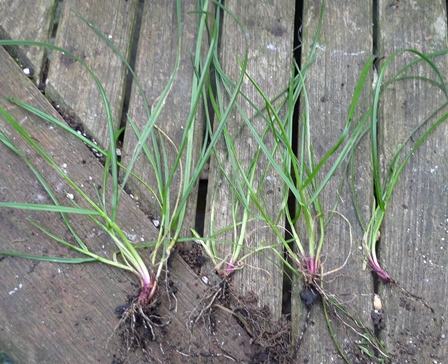
also couch grass or another grass? this looks quite different from the clumps above but maybe they would turn into that given time?
close-up of one of the spreading roots above
another type of grass
and a week later
some sort of grass weed, goosegrass? (not to be confused with cleavers), crabgrass? will research further
Ground Elder. Perennial, must be dug out, including every piece of root which will grow if left. I did have it over half the garden but I don't seem to have any now after digging it out and repeating whenever I see any which is what Bob Flowerdew recommends. Eventually it weakens the plant. It took a few years but it worked.
The photo above is from 2011, one of my earlier weed photos. I had worked hard to remove all the ground elder so was surprised to see a fully formed plant with a spray of flowers beginning of June 2018.
It grew quite tall to reach the sun.
I thought I had completely eradicated ground elder but found a couple little sprouts.
This last pic here shows the ground elder with the roots after I dug it up. I got most of it but some definitely broke off. I'm sure it will come back but I must keep digging it up whenever I see it.
Annual easy to pull out.
another example
early groundsel seedling
I saw this a few weeks ago and mistook it for horseweed but today (a few weeks later) it was a lot more identifiable. (I did take a pic but it's not as clear as the one above.)
this has me completely confused, it looks similar to groundsel but the leaves are a different shape, ragwort? Oxford ragwort?
and just to confuse things further, a groundsel has self-seeded itself next to this (pulled it out and laid it next to this for comparison) and it is definitely different leaves at the top but similar leaves at the bottom, definitely thinking senecio weeds (groundsel, ragwort, Oxford ragwort, not sure if there are others)
this is one of those plants, does it go on the weed page or plant page? this and the dryopteris fern act very weed-like, this self-seeding in a wall by the Regent's Canal near King's Cross, so I think they can be acknowledged as weeds
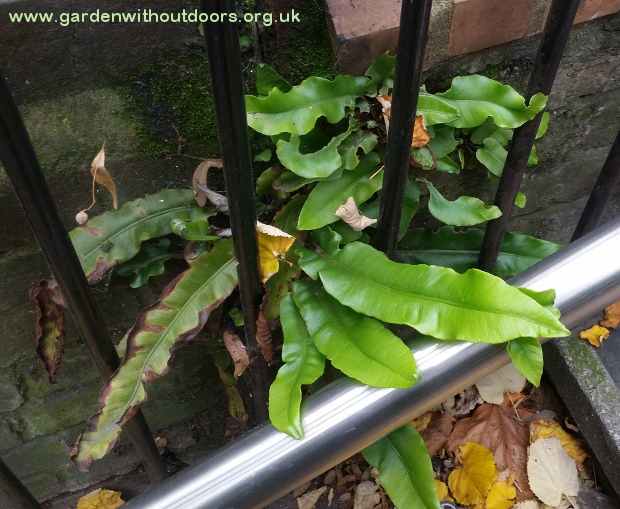
I saw this hart's tongue fern in a Regent's Park garden mid-November 2018 so not a weed in this instance.
underside of the hart's tongue fern showing the spores
August 2024


hawkweed oxtongue flower close-up - although this and many other dandelion-type flowers are similar
the hoary mustard initial basal rosette often persists through flowering, see the Rosettes page for more rosettes and Hoary Mustard for more photos
Sept 2020
Sept 2023

May 2022

June 2021
Hogweed and Hairy Bittercress, below, also see next 2 entries.
The following is hairy bittercress. At first it's quite low-growing, a small clump on the ground (see hogweed pic above) but then the flower stems shoot up as below. Annual, easy to pull out.
The seedling is quite flat on the ground and then suddenly a stem shoots up from the centre.
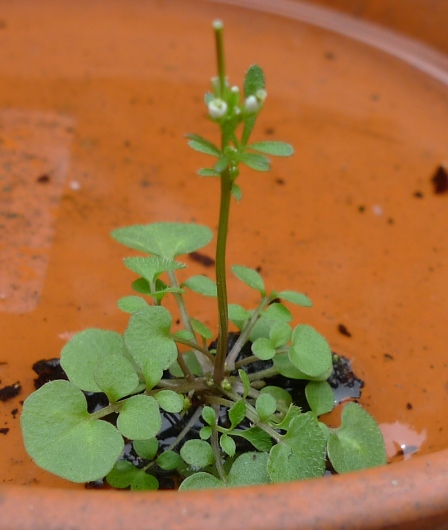
hairy bittercress seedlings, before the central stem has shot up
and here is the tiniest, tiniest beginning of the hairy bittercress (about 1.2 cm wide)
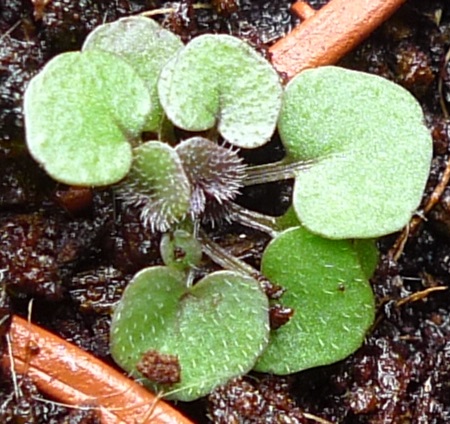
with the cat just to put it into perspective (it's the seedling on the bottom right)

This is one of the oldest hairy bittercress I've seen. I've just discovered it in a pot end of March 2015. It seems to have survived the winter, which was mild and turned into an established plant - that won't last long!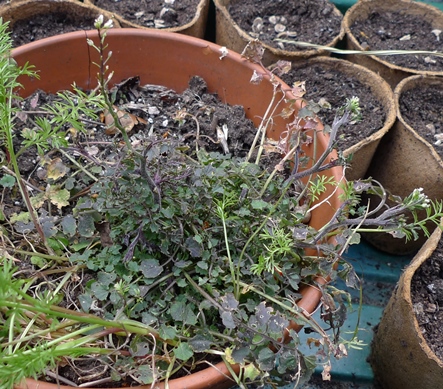
Hedge Bedstraw (Galium mollugo)



Hedge Mustard (Sisymbrium officinale)
I'm surprised I've never seen this in the garden before today (June 13th 2014). I'm seeing this everywhere now. I pulled it up and put it on my front doorstep to take a pic. I think hedge mustard must go in phases. 2014 was a year for hedge mustard and I'm finding 2017 is as well.
It's appeared both in the garden and out, the pavement outside my house.
close-up of the hedge mustard flower
I saw a lot of hedge mustard yesterday (21-4-2017) off a main road and wanted to show some more details of it.
before the longer stem with the flowers appear
close-up of the hedge mustard flowers and buds
full-size example
seeing all that hedge mustard the other day made me re-consider the plant on the left which I had originally (mistakenly) called smooth sow thistle but I realise it is hedge mustard (prickly sow thistle on the right)
close-up of those textured leaves
and another view of that close-up
Hedge Woundwort (Stachys sylvatica)
I saw this at RSPB Fowlmere (Cambridgeshire) so adding here. Honestly don't know how common it is actually in London. Previously I just had it at South Downs and Coast.
leaves further down the plant
There was a lot of the hedge woundwort at Fowlmere so I was able to see it at all stages. This is one of the small plants.
hemlock flower close-up
close-ups of those distinctive speckled stems and leaves
close-up of the flower
close-up of the leaves
stem close-up
Hemp-agrimony (Eupatorium cannabinum)
I saw this at RSPB Fowlmere end of September 2018. It is similar to Joe-Pye weed and I'm not absolutely certain of the differences but as hemp-agrimony is a native wildflower in the UK and Joe-Pye weed is native to North America I think hemp-agrimony is a more likely ID for this.
Certainly lots of it, at all stages, mostly fluffy spent flowerheads but also buds and flowers. Firstly, buds.
close-up of the buds with some just starting to open
close-up of the flowers fully open
flowers in full bloom and some starting to wilt
dry fluffy seed heads
I saw this at Spitalfields Farm (East London) this week (August 2017).
close-up of the flowers, vetch in the background
Herb Robert (Geranium robertianum)
The following 3 photos show Herb Robert. Some people grow it as a garden plant. Personally I can't bear it, especially the smell, and pull it out wherever I find it. Annual, easy to pull out.
And here is herb robert in bloom. Some people like it as a flower. I pull it up as a weed wherever I find it.
Herb Robert seedling, the seed leaves precede the very distinctive leaves

also oxalis and teasel in this pot
The following are hogweed. I collected the seed as a wildflower but not sure it's good for a small garden so disposed of it (very small hairy bittercress in the ground to the left of the pots).

very small honesty (lunaria) seedlings


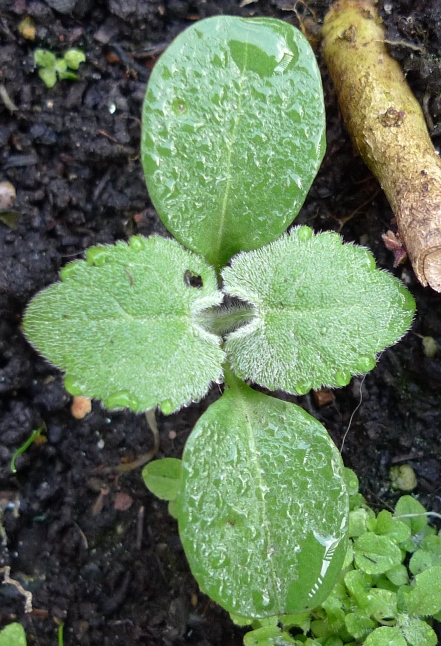
a small honesty plant with those distinctive center leaves

Horsetail (Equisetum arvenses)
I saw this at a train station in southwest London, first week of May 2018.
(I also saw some brown dried spikes of horsetail on the South Downs in April 2018, see South Downs and Coast identification page)
Horseweed / Canadian fleabane (Erigeron canadensis)
(There is also Guernsey fleabane (Erigeron sumatrensis), the 2nd most common; Bilbao fleabane (Erigeron floribundus) and Argentine fleabane (Erigeron bonariensis). I have not been able to photograph and identify the differences - yet.)
horseweed can be really shaggy

not all plants start shaggy


Houndstongue (Cynoglossum officinale)

Iris foetidissima
This is another self-seeder and it can make rather large clumps. It's useful in shady areas where it's difficult to get things to grow but it can also get invasive and weed-like. Difficult to pull out.
Iris foetidissima flower
Iris foetidissima seed pods

iris foetidissima seed pods splitting open to reveal those bright orange seeds
Ivy (Hedera)
Ivy can root anywhere. If you try to cut ivy down but don't remove all the branches, they will root into a wall, brickwork, anywhere. Don't think if you cut connection to the roots, you have killed it, you haven't! I found this ivy had rooted into a bag of crushed shells I had for mulching.

types of ivy leaves I have in my garden, I guess there was lots of ivy there when I moved here
I came across this ivy in flower with lots of bees at RSPB Fowlmere last week (end of September 2018) and wanted to know which kind it was. I think it's Irish ivy (Hedera hibernica). It reminded me of my comparison of the ivies I have in my garden and the photo I took of all the leaves back in 2014 (above). Now I need to go back and research which kinds they are.
Ivy-Leaved Speedwell
tiny flowers, matt and hairy whereas the ivy-leaved toadflax below is smooth and shiny
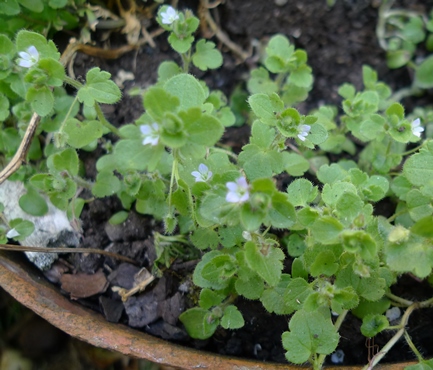
Ivy-Leaved Toadflax
This was taken beginning of April, when the flowers appeared. Smooth and shiny in contrast to the ivy-leaved speedwell above which is hairy.
the reddish buds before the flowers appear, below

Japanese Knotweed (Reynoutria japonica, synonyms Fallopia japonica)


see also separate page Japanese Knotweed
Joe Pye Weed (Eutrochium purpureum)
Knotgrass, see Common Knotgrass
Lamb's Ear (Stachys byzantina)
I'm putting this on the Weed rather than Plant page as it self-seeds like a weed, as it's doing here in this pot. At first the leaves are quite textured and most unlike the fuzzy leaves to come later.
those supersoft leaves coming from the centre
small plant all fuzzy
full-size lamb's ear plant flowering
Lemon Balm (Melissa officinalis)
close-ups of some of the lemon balm flowers, the buds appear quite yellow but after they open the flowers appear white
This suddenly appeared, fully formed, in this clump next door (August 2014). They aren't keen gardeners but I thought I would have noticed! The flowers are very thistle-like but the leaves are completely different.
this entire clump is burdock, I'm not sure if it's lesser or greater burdock
that clump above has long since been cleared and recently (June 2016) the lawn was mown, shortly after that this small plant appeared
I saw these yesterday (21-4-2017) off a nearby main road. I wonder how tall they'll get if left to grow.
this lesser burdock I saw at RSPB Fowlmere in Cambridgeshire end of September 2018
Lesser Knapweed (Centaurea nigra)
I bought this as a "wildflower" at the garden centre (they were on sale so couldn't resist) but some may have this self-seeding in their garden.
close-up of a knapweed flower
London Bur-Marigold (Bidens Connata)
This has been in my Weed Gallery (a few picturesque weed photos) for years as an unknown but I recently came across an ID. I saw this growing in the Regent's Canal near me in Camden Town, northwest London, appropriate as it spread along the Grand Union Canal network, of which the Regent's Canal is part.
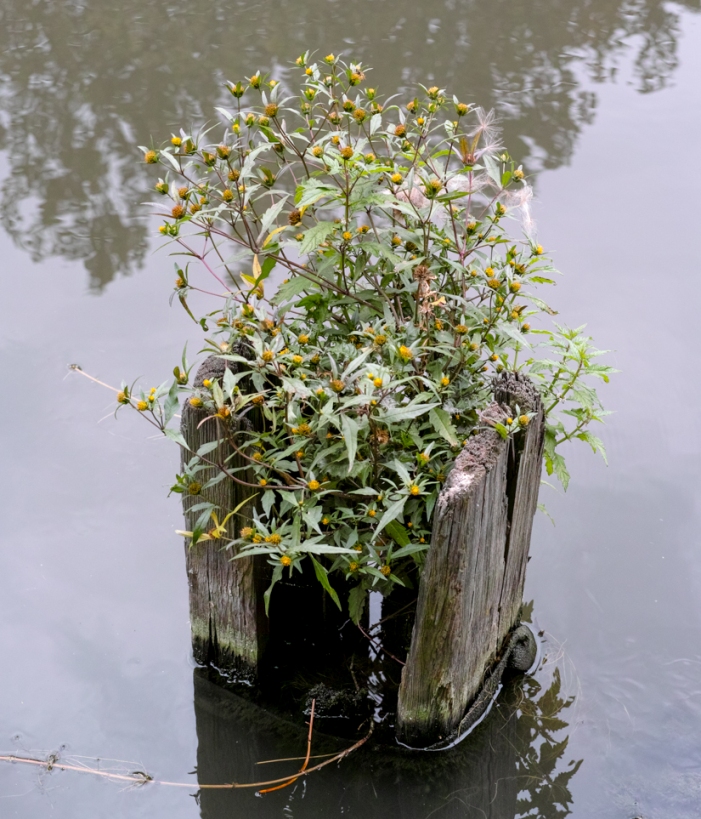
Liverwort (Marchantiophyta)
This is a moss-like weed that has appeared in some seed trays.
from that one small "sprout", the liverwort has spread quite a lot in my pots but it doesn't seem to cause much of a problem, recently I've noticed these upright growths
London Rocket (Sisymbrium irio)
in March when I first noticed it
April when it's blooming, small cluster of flowers
end of April with fruits
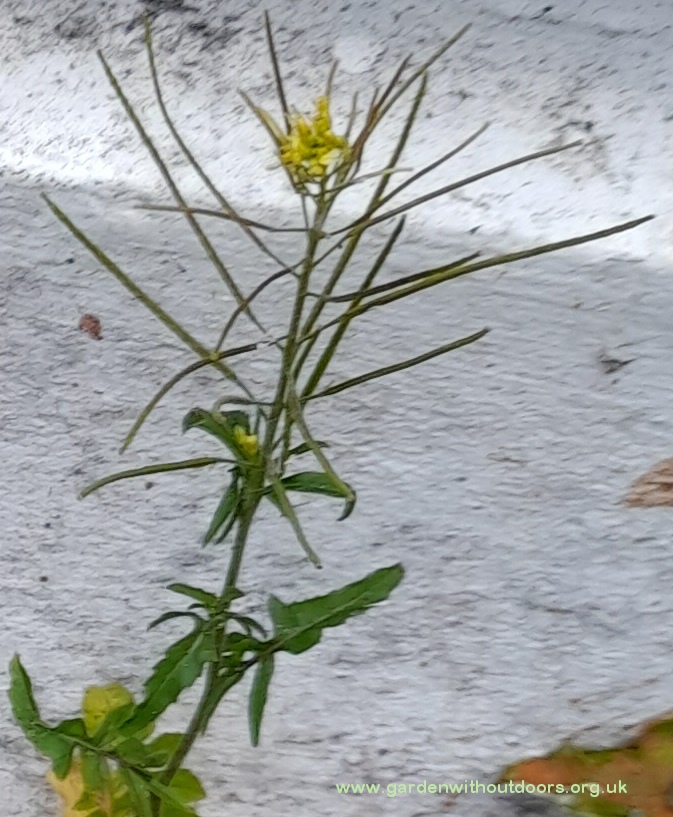

Maidenhair Spleenwort (Asplenium trichomanes)

mallow leaves
This is a maple seedling. For some reason I have masses of them this spring (2012). I wasn't sure what they were, as I never noticed them before, until I found this one with the seedpod (whirligig) still attached.
here's another whirligig with the seedling just emerging
Here's a larger one.
This is it after I've pulled it out of the ground which gets more difficult as they get larger. I just about managed this one as the ground was wet.
Meadow Buttercup (Ranunculus acris)
Meadowsweet (Filipendula ulmaria)
close-up of the meadowsweet flowers
meadowsweet seedheads

close-up of the meadowsweet leaves
Yellow Melilot (Melilotus officinalis)
I saw this beginning of July 2019, near the railway line, along from Camden Road station where I'd originally seen melilot from the platform but couldn't get a very good view.
a view of the wider environment with the railway line in the background
White Melilot (Melilotus albus)
I saw this on the edge of Epping Forest 19-7-2019
Many-seeded Goosefoot (Lipandra polysperma)
Milk Thistle (see Plant Identification page)
Michaelmas Daisy (Aster Amellus)
August 2017, this year the flowers are earlier because of the hot weather we've had
the michaelmas daisies are the plants with the long thin leaves amongst the chinese lanterns
mid-September 2014
mugwort buds close-up
mugwort flowers
mugwort young plants

I had this misidentified as a cut-leaved geranium as the leaves as so geranium-like but I realised the flower just wasn't geranium but musk mallow.
musk mallow leaves
white flowers and green and black (bottom left) berries, I saw this along the Regent's Canal
I saw this in Bloomsbury this week (15-8-2016), very distinctive leaf shape as above
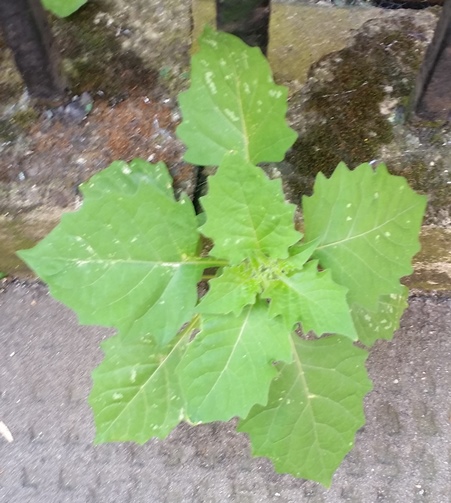
Nightshade, Woody also known as Bittersweet
Thank you to Suzanne who originally identified Woody Nightshade. I've taken a better pic of one I saw round the corner.
its distinctive purple and yellow flowers (that green plant wrapping around it is something else, think maybe honeysuckle)
Narrow-leaved Ragwort (Senecio inaequidens)
Nipplewort (Lapsana communis), early July I see lots in flower (see example below), annual
Also see A Study in Nipplewort
Here's a nipplewort seedling mid-April. In my efforts to show the earliest seedlings I wanted to show this. If we can identify these very early seedlings we can weed them out before they get established, but most importantly before they set seed.
nipplewort seedling as a rosette of leaves, I think, like horseweed, nipplewort starts with a rosette of leaves depending on when it starts growing
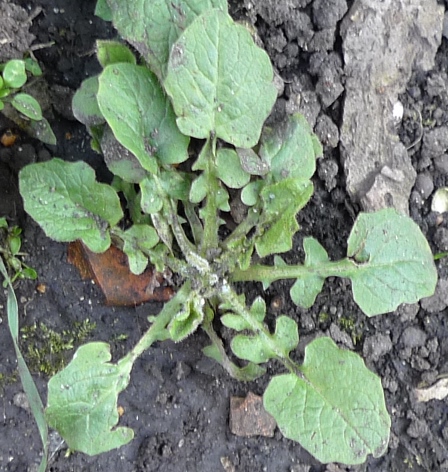
this nipplewort seedling started off as a rosette flat on the ground (end of January/beginning of February 2017) and just started to grow upwards before I took this pic (on Feb 18th)
close-up of the nipplewort flower
Old Man's Beard (Clematis vitalba)
I saw this near the entrance to Camley Street Natural Park (Victorian water tower in the background which was moved from St Pancras to near St Pancras Lock, the other side of the tower). I also see this clematis self-seeded in the garden next door to me but it's not nearly as developed as this and it hasn't bloomed this year.
seedheads not quite "beardy" yet, one in the pic above is getting that way
Old Man's Beard self-seeded in the patio next door April 2018
more identifiable June 2018
September 2018, not developed enough to bloom that year
huge shrub up the road with fluffy seed heads
Orache, see Common Orache
Oxalis
checking which one this is
I usually pull the oxalis up whenever I see it but one plant bloomed before I noticed it and then I realised I didn't have a pic here of the flower so I've taken one. I just noticed the yellow buds on the plant above.
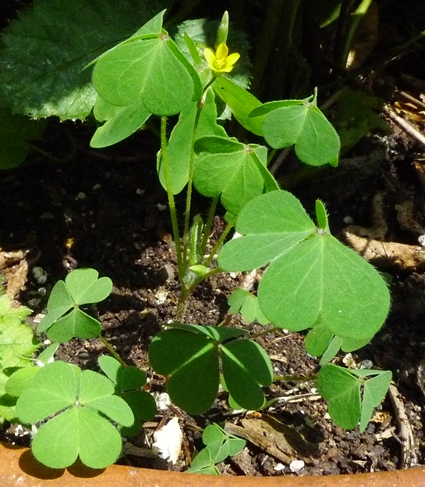
thank you to Tom for alerting me to oxalis growing from little bulbs left in the soil under the surface
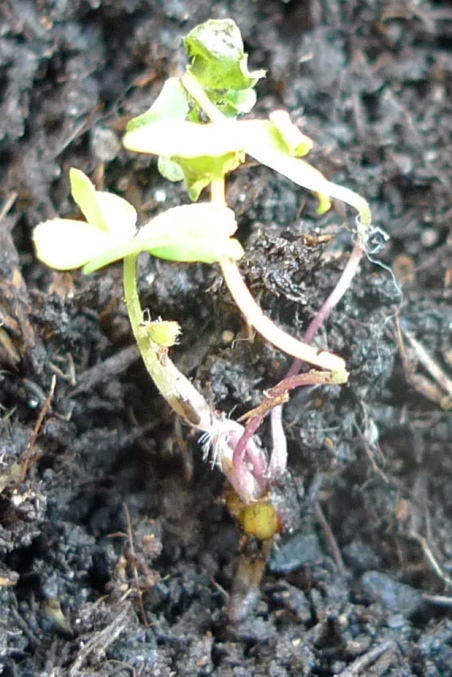
Oct 2018, I took this out of a pot where it shouldn't have been. (Oxalis latifolia? or debilis?) I'm not absolutely certain. It has a large bulb and bulbils around the top. On the right is a larger bulbil that obviously developed to a larger size on its own. All the leaves are from stems growing directly from the ground unlike other oxalis which may have branching stems.
the bulbils easily broke off when I dug it up
close-up of the bulb and bulbils
After I was trying to identify this I realised I hadn't seen it flower and didn't know if it would produce pink or yellow flowers so I rooted around in the compost pile and found it (the bulb was slug-eaten) and planted it again in a pot to see what it would do and help me make a definitive ID - next year now I guess.
Also called Iron Cross. We all have personal preferences on weeds, wildflowers and garden plants, this may be considered a garden plant but I would pull it up as a weed if I had it in my garden. I saw this round the corner in someone else's. (tiny herb robert seedling at the top and small rosette of (wild?) rocket at the bottom)
Ox-eye Daisy
another plant I sowed from seed as a wildflower but it can get invasive
This is my first year of these self-seeding. They do look quite prolific.
some smaller seedlings from another year (2017)
quite close to a sea holly seedling (also don't know the seedling top right)
they've appeared in other places, left ox-eye daisy, right anemone? 6-7-2017, see below for a few weeks later
a few weeks later one of the seedlings
that example above with the anemone? 23-8-2017
Oxford Ragwort (Senecio squalidus)
mid-April 2019 in the disused walled east London cemetary I visit occasionally, Oxford ragwort has those distinctive black bits
back in mid-February I saw this local to me, I thought it looked similar to groundsel but a bit different
mid-March, still not sure
by mid-April, in bloom and identifiable as Oxford ragwort with those distinctive black bits
Pale Smartweed, Pale Persicaria (Persicaria lapathifolia)
This was growing in a crack on the front path next door. By pulling really hard I managed to get it up and even including the root, as shown below.

I can't remember how easy or difficult this one was to pull up. Much more developed than the one above.
Spotted Persicaria (Persicaria maculosa)
I saw this persicaria down by the canal, July 2017. I think it is different from the ones above but not sure as they are such poor specimens and photos (pic directly above was one of the first weed pics I took and doesn't show the top of the leaves and if they have marks like below. I hope I know better now). I found it in my weed book as Persicaria persicaria but wiki tells me that is not allowed in the latest international agreement on naming plants which I guess the book predates).
Pellitory-of-the Wall (Parietaria judaica)
Large clumps which must be pulled out at ground level. (this is one of the first weed pics I took, must take another esp showing the buds/flowers)
Small plants, surprisingly easy to pull out - until they turn into larger clumps that must be dug up. Most of the time they are just upright leaves but in the summer (?) they have catkins (not sure what else you call these). NB they look exactly like some of the nutsedge images I've seen. Unless they have the catkins or the flowers I don't know how you tell them apart.
when the sedge is small like the example on the left below it's easy to pull out but when it gets as large as the clump on the right below it needs to be dug out which I did on this clump
I think I finally have this accurately identified. I noticed this mid-July locally (Camden Gardens, north London) after previously only seeing it on the southcoast and putting it on my southcoast identification page.
March 2017, I notice some small plants in the same spot and think they are the new season's growth. I don't know if they are new seedlings or growing from the existing plants. Will keep a watch on how they develop. -update - they did grow and bloom but before I could take a photo they were vandalised, maybe because someone noticed me taking photos and taking an interest in them? That's a discouraging aspect of life in London.
a close-up of the leaves show the prickly edge
Annual, easy to pull out.
I don't know a common name for this. I bought it as a green manure some years ago but this one I saw in a park nearby (May 2019). I don't know if they planted it or it self-seeded. I love the flowers.
Pheasant Berry / Himalayan Honeysuckle (Leycesteria formosa)
August 2018 I saw this on Camden St, London NW1 fully developed and in bloom. I don't know how long it was there but I presume not very long in that position so guess it grew and flowered quickly, unlike the one that self-seeded in my garden (see below) which never bloomed in 2 years.
flower close-up
environment where I saw this
January 2019 there were berries
I had this appear in my garden (July 2014) but wasn't sure what it was. Someone suggested pheasant berry / himalayan honeysuckle so I kept it for a year to see if it would flower. It never did and I got fed up waiting for it and having it take up room on my patio so disposed of it.


March 2017 this has appeared in my wall.
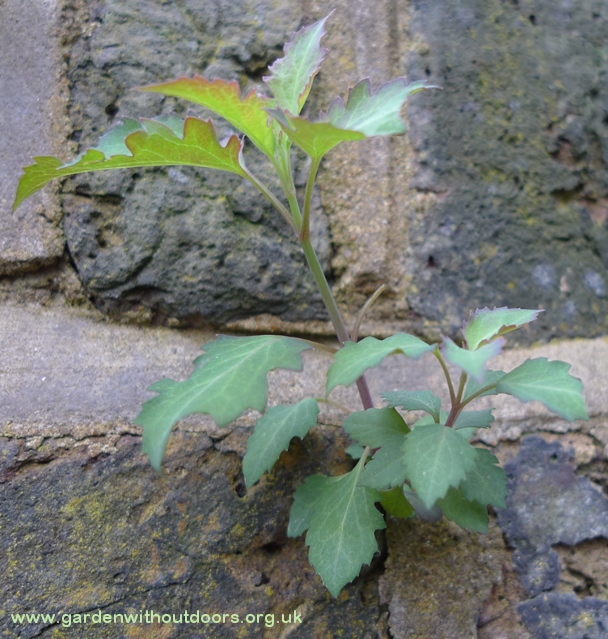
mid-August
on the pavement near my house I noticed these weeds, at the end of each branch there is a spray of buds, small pellitory of the wall to the right
some smaller plants without the "flower"s on the end of a branch
to the left looks like horseweed, to the right chickweed
an update on the pigweed end of August


a close-up of the "flowers" middle of September
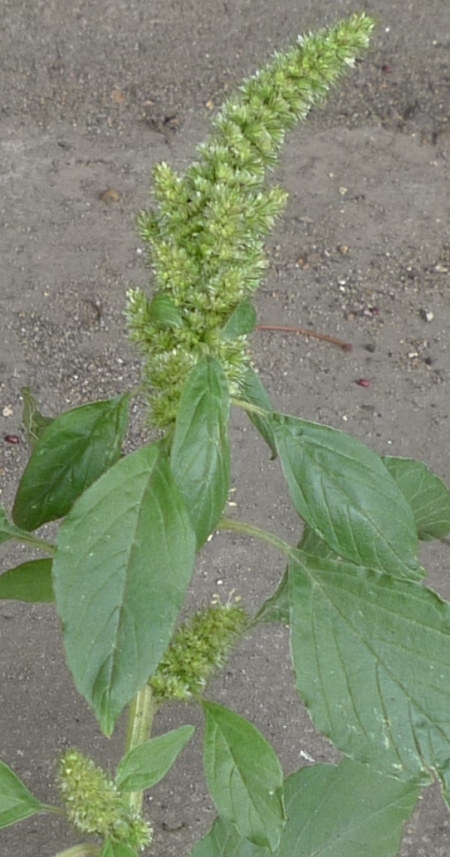
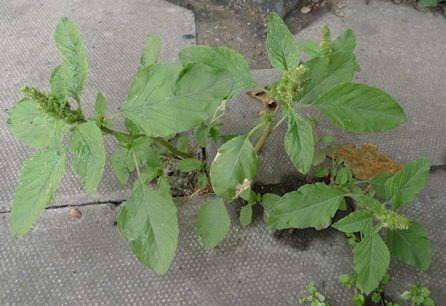

Pineapple Weed (Matricaria discoidea)
I saw this yesterday (16-5-2017) outside Sainsbury's on Camden Rd. Easy to recognise from pics I've seen but I'd never seen it in person before.
close-up of the flowers
Pink-Sorrel (Oxalis articulata)
I saw this in a disused cemetary in east London May 2018. Some of the plants were in the sun as this one in full bloom, some shown below were in the shade so still in bud.
these are some of the flowers in bud, in the shade
close-up of some of the buds
Pink Woodsorrel (Oxalis debilis)
I had this in a pot a few years ago.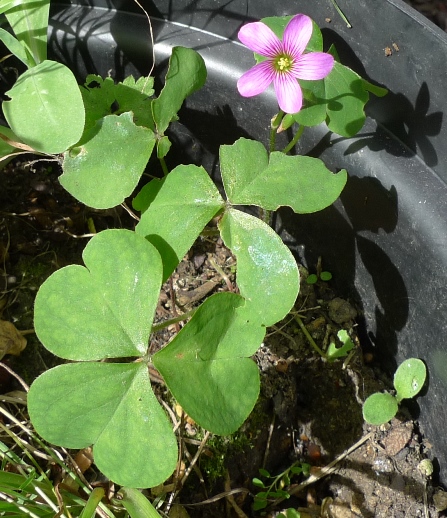
different types, apologies as until recently I had field and atlas mixed up
known as corn or field or red poppy, in bloom May 2018
Month before in April. I had to buy these from the garden centre as attempts from seeds were not very successful.
Atlas Poppy (Papaver atlanticum)
opium poppy (Papaver somniferum)
I have poppies in my garden which I grow from seed, this one is the kind I have self-seeding.
Prickly Lettuce (Lactuca serriola)
I suddenly starting seeing these end of April / beginning of May 2019 locally.
the prickles along the leaf spine underneath are very pronounced
unlike the other examples, this one does not have lobed leaves but it appears to the the same prickles on the stem and under the leaves (also wall lettuce to the left and horseweed to the right)
Prickly Sow Thistle
not to be confused with smooth sow thistle (see below), the leaves may be the same shape (ie lobed) only prickly or more oval-shaped like this one
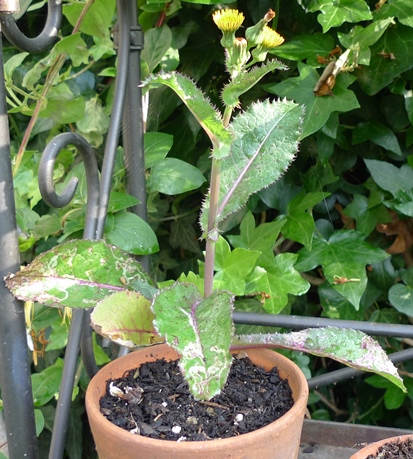
In the pic below I wanted to show how the leaves curl around the stem.
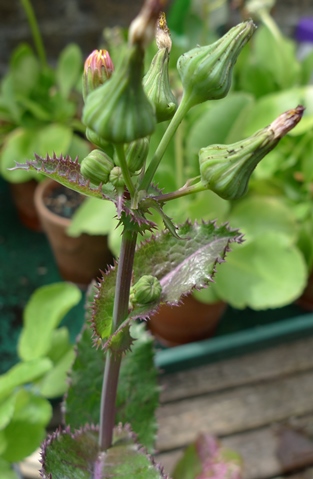
this one self-seeded between the cracks

and this prickly sow thistle self-seeded on the left in the pot below right (next to a teasel), also pot on the left has foxglove at the bottom and teasel at the top

and that prickly sow thistle seedling from above, leaf is about 5 cm long

I first noticed this prickly sow thistle in the pot with the hosta Sept 2014.
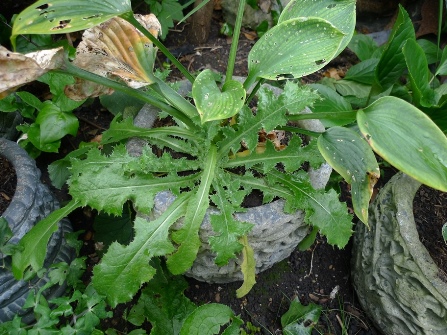
The following spring (April 2015) it seems to have replaced the old leaves with this beautiful rosette of leaves. I still wanted to see it develop and bloom but also wanted the hosta so I pulled up and prickly sow thistle and put it in its own pot. It had a very large taproot, visible below.

Beginning of June 2015 and one of the flowers has developed into a seedhead, like a dandelion, time to dispose of this before any of those seeds with "fluffy bits" (pappus) float away!

a tiny tiny prickly sow thistle, to the right, below, with the yellow flower, mid-July
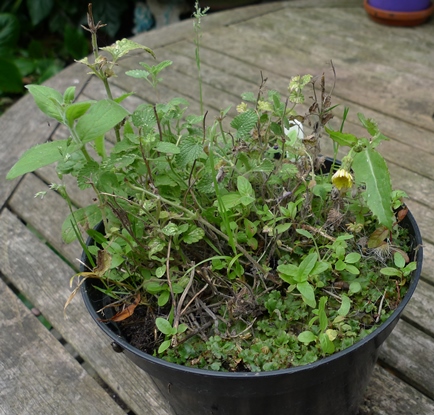
only about 10 cm tall, after I pulled it out
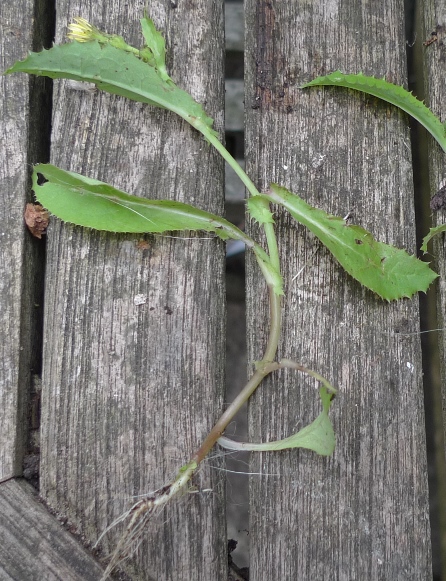
this fresh green shoot is not the usual prickly sow thistle - although distinctive (prickly along the leaves) and identifiable if you examine it

a prickly sow thistle I noticed around the corner April 2017
Purple Loosestrife (Lythrum salicaria)
I saw this along Regent's Canal today (10-7-2018).
close-up of a flower
view of the entire plant
close-up of the buds
Ragwort/Tansy Ragwort (Senecio Jacobaea)
small ragwort seedlings
initial rosette, this is on the patio of the garden next door at the back, the one I help look after
this example I saw in my sister-in-law's garden in northwest London shows the basal rosette similar to the one above
this is in the front garden next door (on the other side, ie not the one I look after) and I'm thinking it's Oxford ragwort as it's more sprawling and less upright than above and the examples on the bee page and South Coast page
red and white campion
another plant late summer
close-ups of the flowers
Red Clover (Trifolium pratense)
even though these flowers are pink, I think this is "red clover"
before flowering
red valerian is an enthusiastic self-seeder
there's also a white variation
(there's another weed there growing under it towards the bottom, slightly to the right, think it's a horseweed)
Rush, Soft Rush (Juncus Effusus)
soft rush in flower, June
small soft rush plant (November), oenothera on the left

same plant following March
I noticed a restaurant on the High St has a couple of rush plants outside it. Sadly, plants like this attract rubbish and cigarette butts but there is something that makes a business owner want to add some greenery to its frontage.
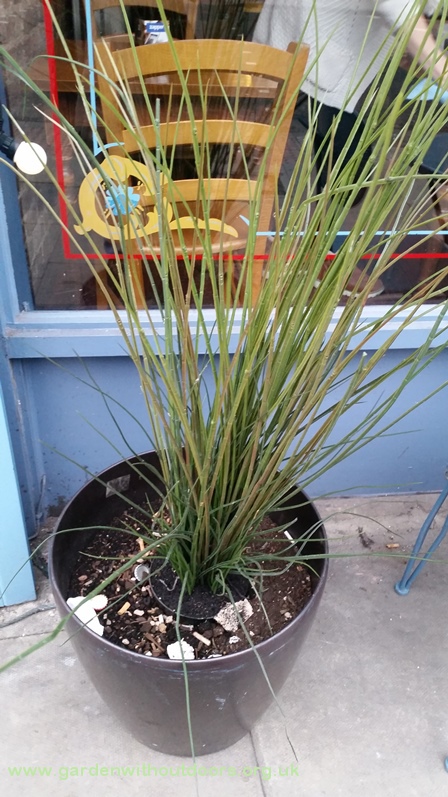

The one above did flower (will find a pic). I continue to have rush seedlings appearing but now I know what they are. At first glance it looks like grass but is thicker than grass. About 2 cm tall at this point.
that seedling above is tiny, below it's in situ in the pot on the left, to the right of the lupin seedling
Salad Burnet (Sanguisorba minor)
thanks for Francine (on FB) for ID'ing this; I hope to see it in bloom next Spring/Summer
Salsify (Tragopogon porrifolius)
I saw this garden escapee on Hampstead Rd, northwest London, end of April 2019.
I first saw this in March and thought it was a goat's-beard. Until it flowers, impossible (for me anyway) to tell the difference between salsify and goat's-beard, both tragopogons.
week or so later
week later
end of April, very developed bud
scrophularia grandiflora
(with thanks to the RHS forum for ID help), I don't know if this is considered a weed, think I saw it described as a such on a web site but can't find that now, I don't like it and it self-seeded so to me it's a weed!

and from above

a few weeks later, yellow flowers on the verge of opening up
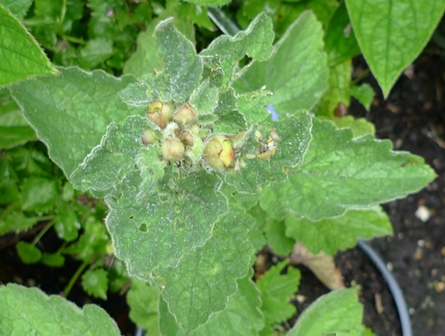
flowers just opening up
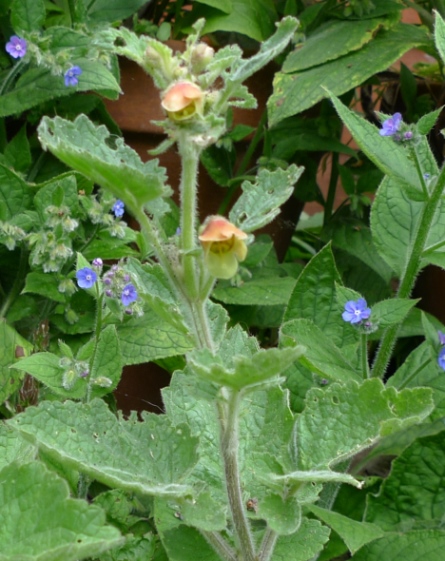

I don't know if this is ever considered a weed but in that location? it sure looks like one. Seen 14-9-2017, Spitalfields, East London
close-up of the flowers
close-up of the buds
I think I've finally found a match for this. It's difficult to say for sure as it's hard to find a really clear pic but this is a very close match from what I can see.
Shepherd's Purse (Capsella bursa-pastoris)
I've seen this in a nearby park and yesterday (21-4-2017) off Hampstead Rd (major road from Camden Town down to the Euston Rd at Warren St). I haven't seen it in my garden but suddenly I seem to be seeing a lot of it in the local area (and Seoul).
close-up of those distinctive seed pods
close-up of the 4-petalled flower in the centre, above it towards the right is a chickweed flower (more petals)
the seed pods developing within the flowers
this is the initial rosette of a shepherd's purse plant
this plant (or plants) shows both the mature plant and that initial rosette
this is a tree seedling but in this location in a crack in the pavement round the corner from me, it's a weed (thanks to Mike (on FB) who helped with ID'ing this)
close-up of the leaves
coincidentally I also had this appear in a pot which I think is also silver birch
Small-flowered Mallow (Malva parviflora)
I saw this along the Regents Canal near King's Cross (northwest London) in June 2018.
close-up of the small mallow flower
I also saw it locally in a park (June 2019). This view of it growing over the pavement gives some idea of scale.
see also Stinging Nettles
the buds are on small horizontal stems, these 2 pics are not great, I'm going to try to take another (in focus this time!)
Smooth hawk's-beard (Crepis capillaris)



lower part of the plant showing leaves


buds




Smooth sow thistle (Sonchus oleraceus)
Annual, I'm afraid there are loads of pics of this but it is such a widespread self-seeder and so common, it's worth looking at variations. As other self-seeders, such as prickly sow thistle and horseweed, may or may not have a well-developed rosette before the main stem shoots up, depending on when they start growing. Smooth sow thistle can have varying amounts of red from none at all to completely red.
1. starting with seedlings
the larger plant on the left has 4 leaves, the smaller plant on the right has 3 leaves and is the youngest sow thistle seedling I have
a bit larger, same 4 basic leaves so far
2. some plants have a more well developed rosette than others
3. full-size flowering plants have extremely variable heights, adapting to their conditions
as a very successful weed smooth sow thistle copes (and flowers) in whatever environment it finds (on a wall next door)
an enormous smooth sow thistle with smooth shiny bright green leaves, March 2017, just down the road in Camden Gardens
Soapwort (Saponaria officinalis)
this is in the garden nextdoor which now is only maintained by me and I like the pink flowers appearing in July so I've left it but it does spread a lot (by underground tubers I think my wildflower book said)
close-up of the soapwort flowers
the purple flowers look nice but it can be incredibly invasive
Spotted Medick (Medicago arabica)
I haven't seen the flowers of spotted medick yet, only the initial rosette and some development of that.
beginning of March 2019
a week or so later
Spotted Spurge (Euphorbia maculata)
seen locally (London NW5) October 2019
close-ups of the leaves reveal the "spots"
common St John's Wort (Hypericum perforatum)
I saw this 12-9-2017.
close-up of a flower
Stinging Nettles
see also Small Nettle
early stinging nettle leaves
Storks-bill (Erodium cicutarium)
I saw this yesterday (21-4-2017) for the first time off Hampstead Rd (major road from Camden Town down to the Euston Rd at Warren St) so not sure how common a garden weed it is. I haven't seen it in my garden.
those long seed pods look like a stork's bill
I saw this local to me at a park, its rosette of leaves is at the Rosettes page
Wild/Alpine/Woodland Strawberry
this spreads like mad, I find the fruits small and often not that nice

I think this strawberry is the usual garden strawberry, different from those small strawberries above, this self-seeded in the wall. First noticed Sept 2017, although I wasn't sure what it was.
June 2018, some months later and identifiable as a strawberry.

Sweet Rocket (Hesperis matronalis)
I saw this one in white in a nearby park, in their wildflower area
sweet rocket seed pods after flowering
close-up of the seed pods after flowering
Swinecress (Lepidium coronopus)
Until this year (2019) I hadn't seen this before. Now I'm seeing a few occurrences. Initially I'd seen flat rosettes like this but today (12-2-2019) I saw some with shoots similar to hairy bittercress. Will add more photos. Note tiny flower buds in the centre.
I have a lot of photos of swinecress and lesser swinecress (and their fruits) to add but wanted to note that lesser swinecress has double kidney bean-like fruits and swinecress has brain-like wrinkled fruits.
Tall Flatsedge (Cyperus eragrostis)
I saw this along Regent's Canal (Camden Town) July 2018
and then end of August 2018
19-7-2019 I saw this tansy on the edge of Epping Forest. The hoverflies were loving it.
I saw this in Spitalfields, east London yesterday (23-6-2018). This somewhat close-up of the flowerhead shows some insects, maybe bees? feeding on it.
view of entire plants
This is a Teasel which can be a weed but I grew these as wildflowers for bees and birds. It's a biennial so I planted these last summer. First pic is flowers in bloom, next is after the seed heads have dried out and the third is a teasel plant the first year. Tough plant that must be dug out if not wanted.
dried seedheads
Teasel, first year
Teasel seedling
as soon as that distinctive texture on the leaves is visible its identifiable as a teasel seedling, below on leaves of 4 and 5 cms, at this point its easy to pull them up if you don't want the teasels in that place, I let a few grow but not to the point where they take over, which they easily do
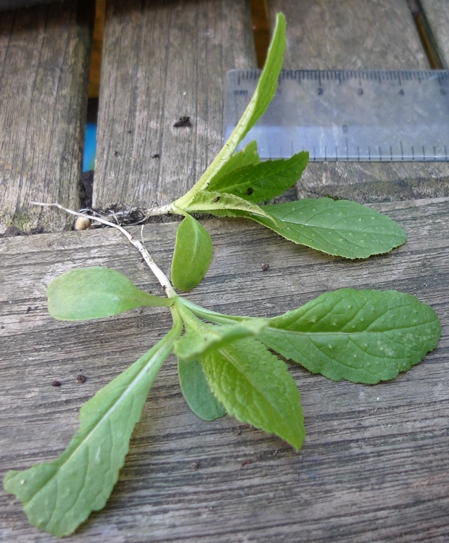
below the seedling from the bottom of the pic above

on the right when the seedlings have grown and have more leaves, on the left the texture of the leaves is just starting to show
Thistles
strong and tough and difficult to remove, I like them as a wildflower but worry about them becoming invasive
creeping thistle, in bloom end of June
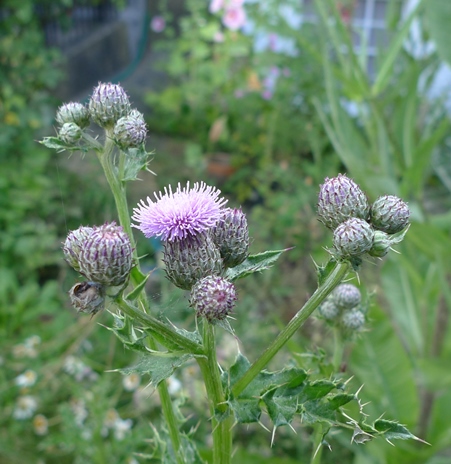
flowers on a spear thistle in July, I love those flowers but this garden (a neighbour's) is close to being a solid block of thistles, although I do see a huge dock with brownish wilted flowers on the left, it's easy to see how weeds get out of control
close-up of a spear thistle before it blooms (end of June)
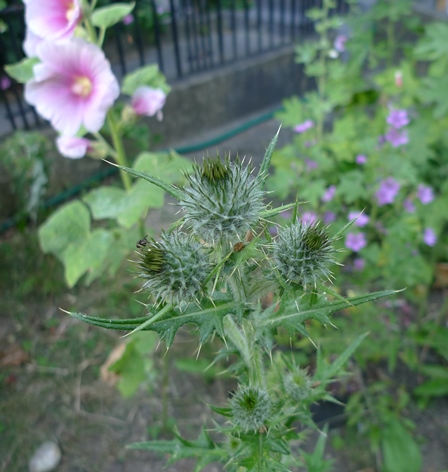
thistle seedlings, not sure which variety but if I let some seedlings grow to see variety I need to keep them potted up so they don't get out of control
thistle leaves
a comparison of thistle leaves, on the left creeping thistle, on the right spear thistle

I saw this rosette of a thistle yesterday (10-1-2016), think it's a spear thistle but will go back (it's along the Regents Canal) and see how it develops

Three-Cornered Leek (Allium triquetrum)
This is in bloom in the bitter cold of February (2018).
the flower stems have a trianguluar shape
lots of buds
Tree of Heaven (Ailanthus altissima)
this is the sort of thing you see springing up anywhere and everywhere, like buddleja
I cut off the branch above and it's grown back, surrounded by jasmine (photo taken from my neighbour's garden)
tree of heaven leaves

I saw some yesterday that were quite red. I guess their environment affects the colour.
Tutsan (Hypericum androsaemum)
In some places this is considered a weed/invasive plant, not sure about North London (11-9-2017).
in full bloom in July
buds in May
close-up of the leaves
new growth in March
Great Mullein (Verbascum thapsus)
this is a biennial, here is the young plant, year one
Verbascum flower, year two
This is one of those "weeds" that has self-seeded in the garden.
at first these look similar to foxglove but then their furriness and those distinctive leaves in the center make it clear these are verbascum thapsus
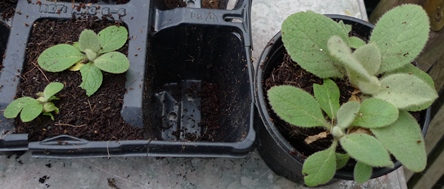
I'm a big advocate of identifying seedlings as early as possible. These are a good example. At first they could be foxgloves or hollyhocks or something else but as soon as those furry inner leaves come out (bottom right, far left), then it's definitely verbascum thapsis and if you have enough of those (or in my case too many!), you can thin them out.
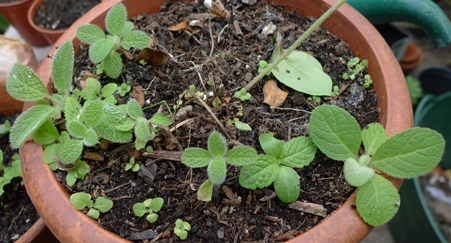
It's been a couple years since I've seen any verbascum thapsis seedlings but this week I noticed this one growing out of a wall by the pavement nearby.
I love these purple flowers. I grew it as a green manure next door although I don't know which specific variety. I saw this one at Spitalfields Farm (East London) the other day. Two brown teasel heads at the bottom.
I first planted this as a green manure, after one of the times the garden next door was destroyed with building work. I love those purple flowers but it's quite small. I pulled this up by accident when I was attempting to make room to plant the small hollyhocks (see Seeds).
Violet (Viola odorata)
These spring up lots of places, usually without the flowers which at least provide some interest. I'll try to note how long they last. April 2014 front garden. Most of the year this looks like a weed but it does flower with "violet" flowers. The thing these self-seeders that turn into weeds seem to have in common is their ability to root anywhere.
Another plant after the flowers have finished, May 2013 back garden.
Viper's Bugloss (Echium vulgare)
I guess this is considered a weed in some circles, personally I love it and planted seeds a few years ago. I don't know if this self-seeded from a seed blowing in or grew from a dormant seed in the soil. (plaintain to the right in the pic below, the soil is rock-hard so that will be difficult to dig up)
close-up of the flowers
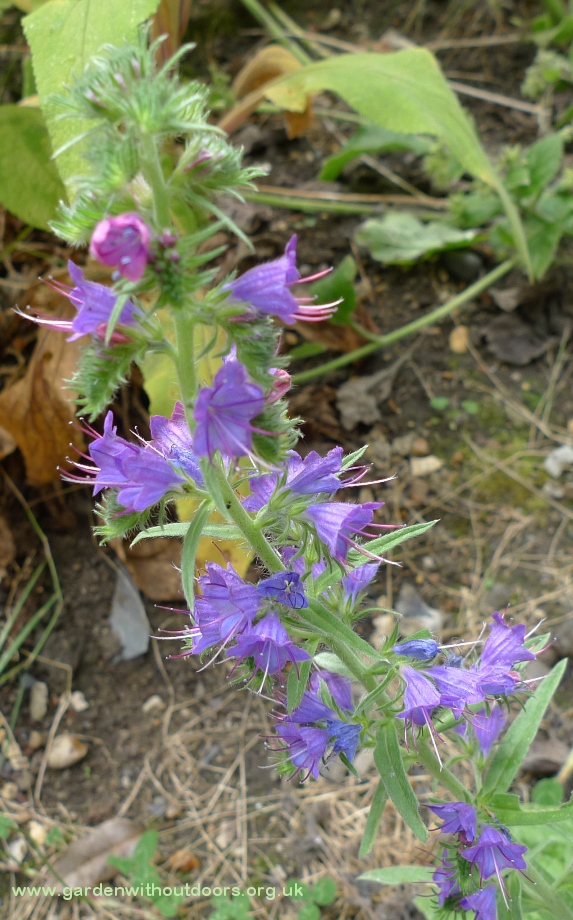
this shows the speckled stem
for comparison, this is the garden cultivar echium Blue Bedder
April 2017
When I first grew viper's bugloss from seed I did not have much success - think I got 1 plant - and did not take photos of the seedlings/small plants so when these seedlings appeared - or at least when I noticed them enough to take a pic (Oct 2016) I didn't recognise them but now, being impatient to find out what they are, looking around the web I think they are viper's bugloss (also foxglove, viola, snapdragon in that small pot) which I did sow seed for the previous few years but never seemed to get any germination.
a reader suggested fox and cubs so I compared the two, fox and cubs to the left and above of the pot, similar in having rosette of hairy leaves
those all turned out to be viper's bugloss
Wall Germander (Teucrium chamaedrys)

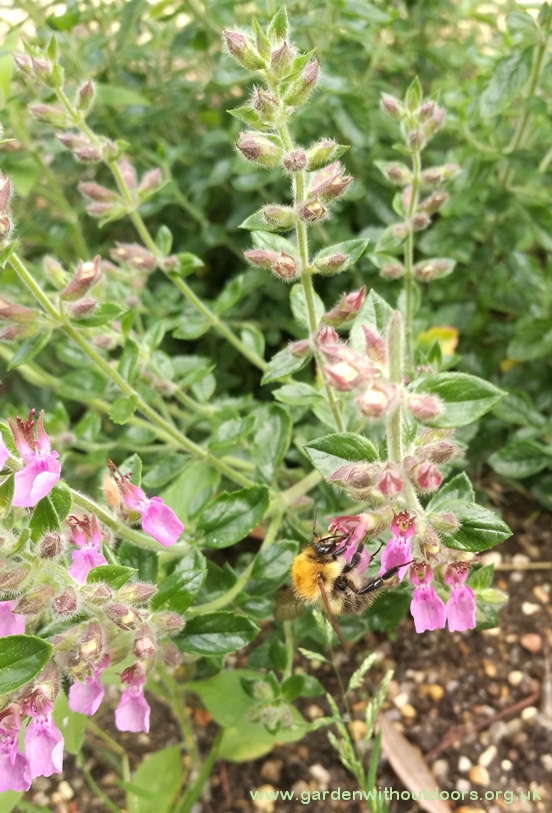
close-up of the flowers

Wall Speedwell (Veronica arvensis)
I saw this local to me April 2019.
I also saw this in the closed east London cemetary.
This wall lettuce is quite tall, 85 cm, one of my earlier photos that I used to take after removing a plant, now I know better - plants start wilting as soon as they're pulled up.
wall lettuce can be rather red
early plant I saw nearby
the buds are looking more wall lettuce, I will see how they develop
the stems with the buds have grown, 10 days later
2 weeks later those buds have opened
Wall Weeds
I've noticed recently how some weeds are so adept at seeding in a wall, which helps them be so annoying. Below are pellitory-of-the wall (back) and corydalis lutea (front), both of which I picture elsewhere. Also sprouting in walls recently are buddleja, foxglove, verbascum thapsis and sweet rocket, also pictured elsewhere.
Water Figwort (Scrophularia umbrosa)
It says (on wiki) the environment for water figwort must be wet or moist but this environment is definitely dry, a north London front garden. June 2018 fully grown and starting to flower.
beginning of June buds are opening
end of May, buds have appeared
I first noticed this back in November 2017. I could see the leaves were not something I recognised and distinctive with the small leaves below the large leaves on the stem. (strawberries in the background)
I saw this at RSPB Fowlmere in one of its marshy areas, end of September 2018.
White Campion (Silene latifolia)
I saw this along Regents Canal yesterday (16-5-2017). I guess other times I've walked there it wasn't in bloom.
white campion before it blooms, the flowers make it identifiable, without them nearby I'd never know what this was
White Clover (Trifolium repens)
I saw this along the Regent's Canal near me. It's such a common plant I never really thought about it before but it was so extensive and exuberant I thought I should take a photo and realized I didn't have it in on weed page so here it is finally, June 2018. Also red clover and yellow Yellow Suckling Clover/Lesser Trefoil/Lesser Hop Trefoil
I saw this in the park across the road (Camden Gardens)
a close-up of some of the unopened buds
I first noticed this very small plant in March and this is how it is most of the year.
In July I see it has flowers. (I had been checking it regularly but the previous time was in May and nothing so sometime in June it developed the buds then flowers)
close-up of the flowers
Wild Angelica (Angelica sylvestris)
I saw this at RSPB Fowlmere September 2018.
wild angelica flowers close-up
wild angelica leaves
wild angelica seedheads
wild angelica seedheads close-up
Wild Cabbage (Brassica oleracea)
Thanks to Caroline who helped me identify this as Wild Cabbage. This was seen along Regents Canal.
Wild Garlic / Ramsoms (Allium ursinum)
end of March 2019, when it first started blooming

fat buds on the plant below, above it some of those round-leaved new shoots
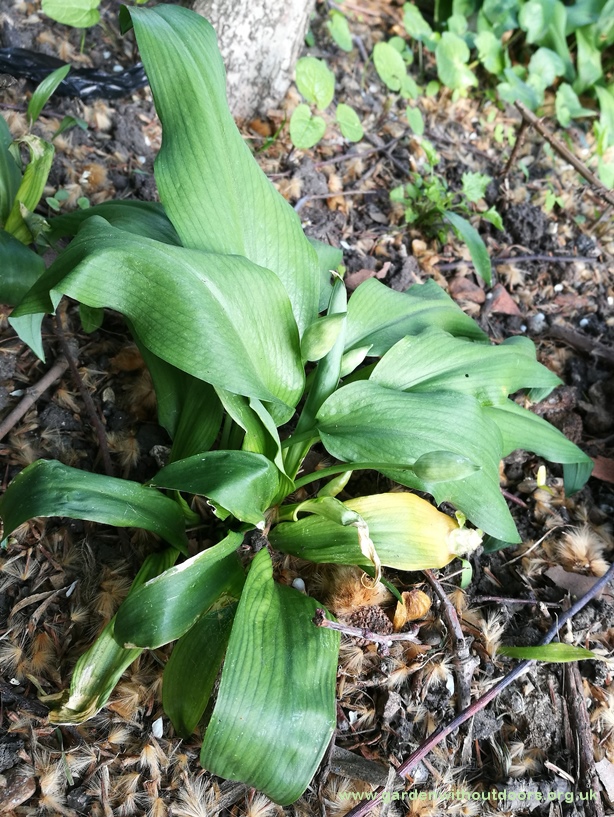
close-up of the leaves
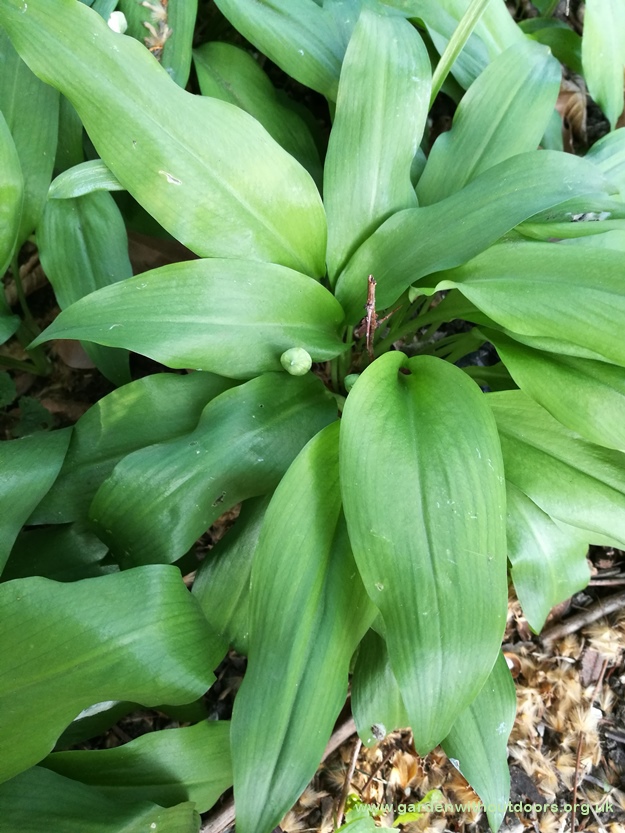
in addition to the full-size plants, I noticed some first year shoots, with the completely different round leaves

Wild lettuce (Lactuca virosa) see Identification - South Coast
Wild Mignonette (Reseda lutea)
I saw this in east London on 17-6-2018.
closest view I could get, it's behind railings along the railway lines
most of these seedlings are willows that have self-seeded, they have a distinctive red tint (that tall one on the left is snapdragon)
a month later, end of July
another seedling 7-2015

in a pot across the road
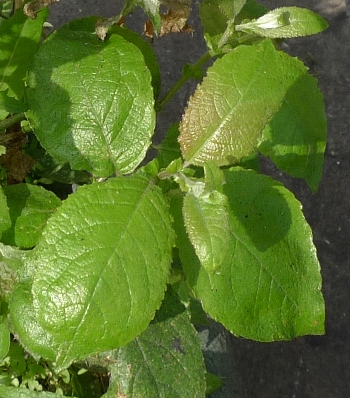
The example on the left in the pot below is like the one above but the 2 on the stairs are obviously a different type of willow, if indeed it is a willow, still not sure of either but I decided I wasn't going going to grow on a full-size willow tree so pulled them up. If the one on the left is a goat willow / pussy willow (I have repotted it) I would consider keeping it but not sure how large it has to be before the catkins. I did have a pussy willow before but it got out of control so cut it down. In a pot it may be easier to control.
Willowherb generally 2 types in our gardens:
broad-leaved willowherb shiny bright-green leaves of classic shape, spreads via roots which emerge as rosettes on the surface of the soil, difficult to pull up if part of a spreading root system
short-fruited willowherb thinner leaves, easy to pull up
In the countryside, there is also Rosebay Willowherb. I've never knowingly seen it flowering in a London garden but I have seen them in flower outside urban areas. Having said that, I think it's growing next door but so far not large enough to flower. - update - pretty sure I've seen it flowering nearby last year (2016) but will check and take a pic this year (2017)
Short-fruited willowherb, the fluffy bits at the top, just starting to show below, contain the seeds.

although the willowherb flowers are usually pink, I found this one that's purple the other day
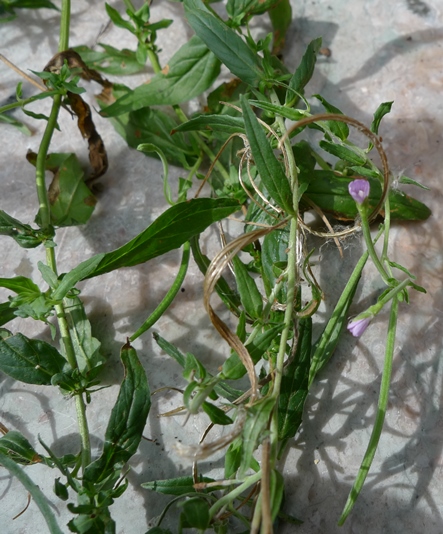
short-fruited willowherb seedlings
tiny early short-fruited willow herb seedling which appeared end of Feb/ beginning of March
Broad-leaved willowherb, by the time I noticed this it's grown multiple stems
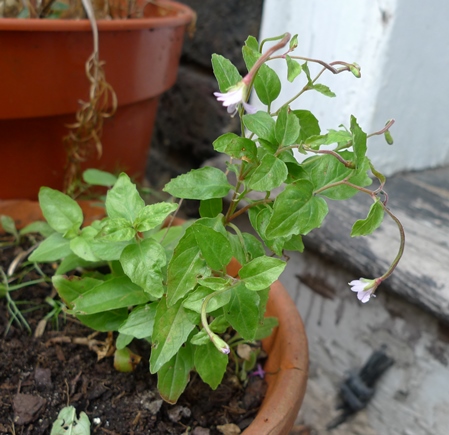
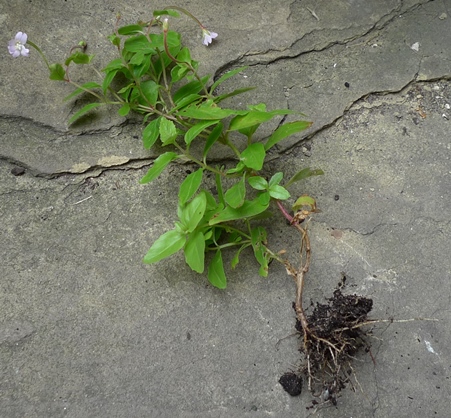
rosettes of broad-leaved willowherb growing from the spreading roots
I noticed some broad-leaved willowherb plants in the back garden and when I pulled them up saw two different sprouts on the roots, red leaved (top below) and green (below in the pic below) and then close-ups of each in the following pics.
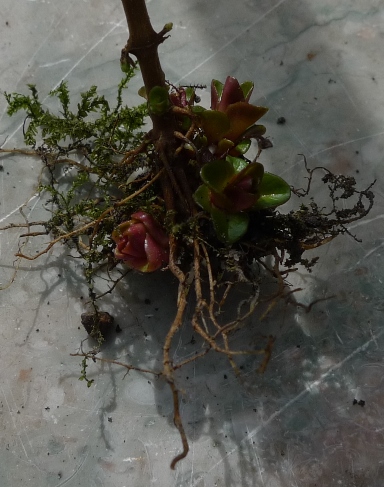

I think this is broad-leaved but I'm not even sure. At this stage it looks as if it could be either.
great hairy willowherb on the left, horseweed on the right
I saw this today along Regent's Canal (10-7-2018).
I saw this example yesterday.
June 2018, this was the first rosebay willowherb I've seen in London, rather than a very tall drift of plants in West Sussex (see below). This was at my local dump.
even smaller than the examples above, I saw this on Camden St, London NW1 today (8-9-2018)
It was only about 30 cm tall. I see berries? (bottom left) I didn't notice them when I took the photo. They were from previous flowers? I certainly haven't noticed this plant before. So it had time to grow, flower and produce berries in a short space of time?
some rosebay willowherb seedlings
3 months later the above has grown a little taller but otherwise little change.
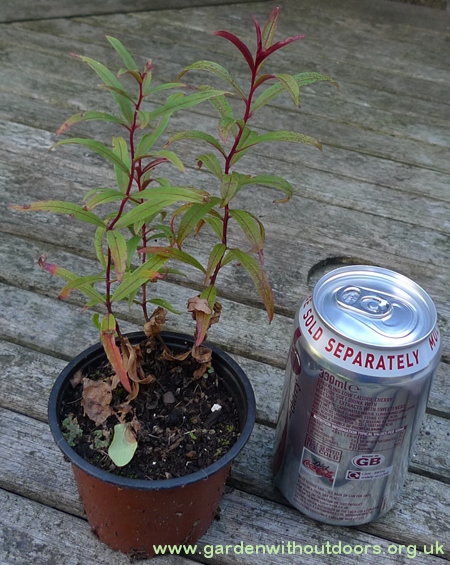
Rosebay Willowherb has a very distinctive veining on the leaves, they don't extend to the edge of the leaf:

underside of the above
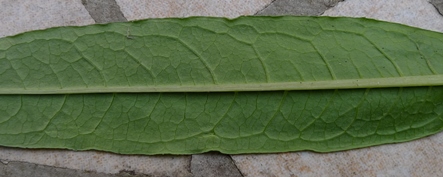
compare with a short-fruited or broadleaved willowherb leaf: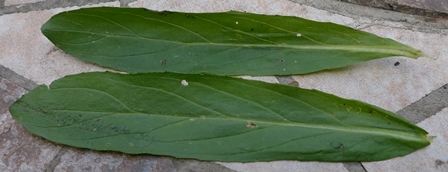
medium-sized plant, second year, discarded after I established what it was

I saw these, full-sized rosebay willowherb plants at the side of the road in West Sussex

This is Wood Avens also called Herb Bennett (Geum Urbanum). I'm sure this was "recommended" by the RHS but they are now calling it a weed. This was one of the first weeds I noticed and took photos of - and I still don't like!
I noticed today (mid-June) that the wood avens were in bloom The following 3 photos show the wood avens flowers.
One thing I've recently realised about wood avens is that the young, first leaves at the bottom of the plant are differently shaped from the older leaves at the top. I guess I thought all the leaves on a plant were one shape. Realising this helps in identifying weeds. I didn't realise that the plant below and the plant above are both wood avens but obviously the leaves are completely different.
A young wood avens some weeks later.
Some weeks later, differently shaped leaves at the top of the plant.
After the Wood Avens have flowered there are prickly burrs with the seeds.
I don't know why I hadn't seen this before in London until this week. I did see it on Hayling Island (see Identification - South Coast). This was in Allen Gardens, Spitalfields (East London).
this one was quite pink
Hayling Island 2015
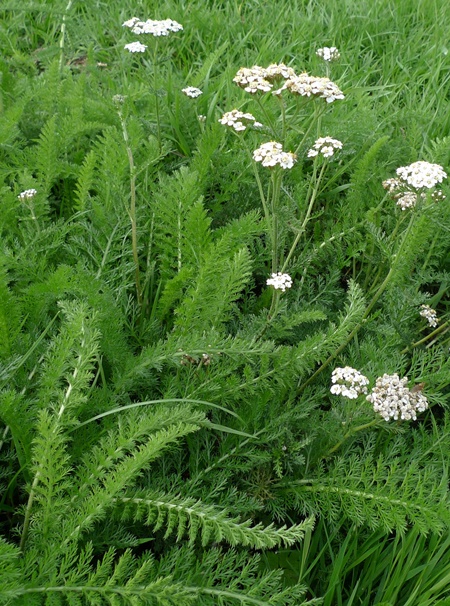
Yellow chamomile (Cota tinctoria)

Also see the end of the Plant Identification page for my unknown plants. Hard to tell sometimes if something is a "plant" or "weed" but here I guess I can decide.
This is also at the Weed Rosettes page. I first saw this in January. Six weeks later and no change.
the plant above is shown below, towards the edge in the middle
in this same area is the seedling below
these are along the Regent's Canal (acanthus on the right, pellitory-of-the-wall behind), as they develop more they should become identifiable
and another umbellifer along the canal
mayweed? scented or scentless?
this looks like bristly ox-tongue but I have never seen small rosettes growing up a main stem like this, seen January 2019 at Rainham Marshes
wild lettuce (Lactuca virosa) first year???
I saw this on Hampstead Rd near Euston Rd in London. I see photos similar to this that are being called "wild lettuce" but also a taller plant with quite different leaves (see South Coast page), is that the second year plant? or are two different plants being called wild lettuce and what exactly are they?
January 2019
2 weeks later
January 2019, Rainham Marshes, I know this is the most difficult kind of identification - in the winter, no flowers and I've only seen it once and probably not again, but the leaves are quite distinctive. Think this is goat's-beard
This is very knapweed-looking but it's not quite like the lesser and greater knapweeds I have in my garden. And it's also very early to have such developed buds (4-3-2019).
a couple more smaller examples
Eastern rocket
red valerian

